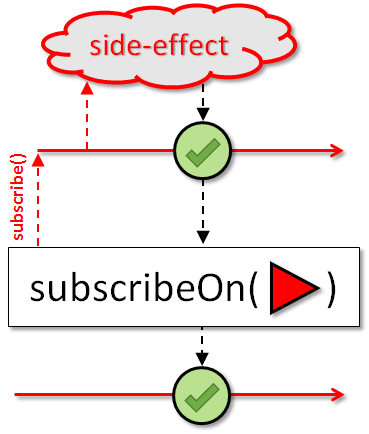| java.lang.Object | |
| ↳ | io.reactivex.Maybe<T> |
 Known Direct Subclasses Known Direct Subclasses
MaybeSubject<T>
|
Class Overview
Represents a deferred computation and emission of a maybe value or exception.
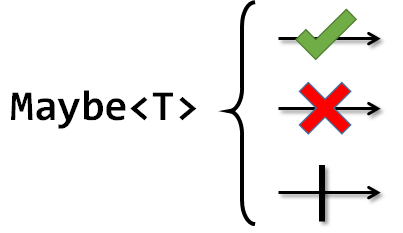
The main consumer type of Maybe is MaybeObserver whose methods are called
in a sequential fashion following this protocol:
onSubscribe (onSuccess | onError | onComplete)?.
Summary
| Public Constructors | |||||||||||
|---|---|---|---|---|---|---|---|---|---|---|---|
| Maybe() | |||||||||||
| Public Methods | |||||||||||
|---|---|---|---|---|---|---|---|---|---|---|---|
| static <T> Maybe<T> |
amb(Iterable<? extends MaybeSource<? extends T>> sources)
Runs multiple Maybe sources and signals the events of the first one that signals (cancelling
the rest).
| ||||||||||
| static <T> Maybe<T> |
ambArray(MaybeSource...<? extends T> sources)
Runs multiple Maybe sources and signals the events of the first one that signals (cancelling
the rest).
| ||||||||||
| final Maybe<T> |
ambWith(MaybeSource<? extends T> other)
Mirrors the MaybeSource (current or provided) that first signals an event.
| ||||||||||
| final T |
blockingGet(T defaultValue)
Waits in a blocking fashion until the current Maybe signals a success value (which is returned),
defaultValue if completed or an exception (which is propagated).
| ||||||||||
| final T |
blockingGet()
Waits in a blocking fashion until the current Maybe signals a success value (which is returned),
null if completed or an exception (which is propagated).
| ||||||||||
| final Maybe<T> |
cache()
Returns a Maybe that subscribes to this Maybe lazily, caches its event
and replays it, to all the downstream subscribers.
| ||||||||||
| final <U> Maybe<U> |
cast(Class<? extends U> clazz)
Casts the success value of the current Maybe into the target type or signals a
ClassCastException if not compatible.
| ||||||||||
| final <R> Maybe<R> |
compose(MaybeTransformer<? super T, ? extends R> transformer)
Transform a Maybe by applying a particular Transformer function to it.
| ||||||||||
| static <T> Flowable<T> |
concat(MaybeSource<? extends T> source1, MaybeSource<? extends T> source2)
Returns a Flowable that emits the items emitted by two MaybeSources, one after the other.
| ||||||||||
| static <T> Flowable<T> |
concat(MaybeSource<? extends T> source1, MaybeSource<? extends T> source2, MaybeSource<? extends T> source3)
Returns a Flowable that emits the items emitted by three MaybeSources, one after the other.
| ||||||||||
| static <T> Flowable<T> |
concat(Iterable<? extends MaybeSource<? extends T>> sources)
Concatenate the single values, in a non-overlapping fashion, of the MaybeSource sources provided by
an Iterable sequence.
| ||||||||||
| static <T> Flowable<T> |
concat(Publisher<? extends MaybeSource<? extends T>> sources)
Concatenate the single values, in a non-overlapping fashion, of the MaybeSource sources provided by
a Publisher sequence.
| ||||||||||
| static <T> Flowable<T> |
concat(Publisher<? extends MaybeSource<? extends T>> sources, int prefetch)
Concatenate the single values, in a non-overlapping fashion, of the MaybeSource sources provided by
a Publisher sequence.
| ||||||||||
| static <T> Flowable<T> |
concat(MaybeSource<? extends T> source1, MaybeSource<? extends T> source2, MaybeSource<? extends T> source3, MaybeSource<? extends T> source4)
Returns a Flowable that emits the items emitted by four MaybeSources, one after the other.
| ||||||||||
| static <T> Flowable<T> |
concatArray(MaybeSource...<? extends T> sources)
Concatenate the single values, in a non-overlapping fashion, of the MaybeSource sources in the array.
| ||||||||||
| static <T> Flowable<T> |
concatArrayDelayError(MaybeSource...<? extends T> sources)
Concatenates a variable number of MaybeSource sources and delays errors from any of them
till all terminate.
| ||||||||||
| static <T> Flowable<T> |
concatArrayEager(MaybeSource...<? extends T> sources)
Concatenates a sequence of MaybeSource eagerly into a single stream of values.
| ||||||||||
| static <T> Flowable<T> |
concatDelayError(Publisher<? extends MaybeSource<? extends T>> sources)
Concatenates the Publisher sequence of Publishers into a single sequence by subscribing to each inner Publisher,
one after the other, one at a time and delays any errors till the all inner and the outer Publishers terminate.
| ||||||||||
| static <T> Flowable<T> |
concatDelayError(Iterable<? extends MaybeSource<? extends T>> sources)
Concatenates the Iterable sequence of MaybeSources into a single sequence by subscribing to each MaybeSource,
one after the other, one at a time and delays any errors till the all inner MaybeSources terminate.
| ||||||||||
| static <T> Flowable<T> |
concatEager(Iterable<? extends MaybeSource<? extends T>> sources)
Concatenates a sequence of MaybeSources eagerly into a single stream of values.
| ||||||||||
| static <T> Flowable<T> |
concatEager(Publisher<? extends MaybeSource<? extends T>> sources)
Concatenates a Publisher sequence of Publishers eagerly into a single stream of values.
| ||||||||||
| final <R> Maybe<R> |
concatMap(Function<? super T, ? extends MaybeSource<? extends R>> mapper)
Returns a Maybe that is based on applying a specified function to the item emitted by the source Maybe,
where that function returns a MaybeSource.
| ||||||||||
| final Flowable<T> |
concatWith(MaybeSource<? extends T> other)
Returns a Flowable that emits the items emitted from the current MaybeSource, then the next, one after
the other, without interleaving them.
| ||||||||||
| final Single<Boolean> |
contains(Object item)
Returns a Single that emits a Boolean that indicates whether the source Maybe emitted a
specified item.
| ||||||||||
| final Single<Long> |
count()
Returns a Maybe that counts the total number of items emitted (0 or 1) by the source Maybe and emits
this count as a 64-bit Long.
| ||||||||||
| static <T> Maybe<T> |
create(MaybeOnSubscribe<T> onSubscribe)
Provides an API (via a cold Maybe) that bridges the reactive world with the callback-style world.
| ||||||||||
| final Maybe<T> |
defaultIfEmpty(T defaultItem)
Returns a Maybe that emits the item emitted by the source Maybe or a specified default item
if the source Maybe is empty.
| ||||||||||
| static <T> Maybe<T> |
defer(Callable<? extends MaybeSource<? extends T>> maybeSupplier)
Calls a Callable for each individual MaybeObserver to return the actual MaybeSource source to
be subscribed to.
| ||||||||||
| final <U, V> Maybe<T> |
delay(Publisher<U> delayIndicator)
Delays the emission of this Maybe until the given Publisher signals an item or completes.
| ||||||||||
| final Maybe<T> |
delay(long delay, TimeUnit unit)
Returns a Maybe that signals the events emitted by the source Maybe shifted forward in time by a
specified delay.
| ||||||||||
| final Maybe<T> |
delay(long delay, TimeUnit unit, Scheduler scheduler)
Returns a Maybe that signals the events emitted by the source Maybe shifted forward in time by a
specified delay running on the specified Scheduler.
| ||||||||||
| final <U> Maybe<T> |
delaySubscription(Publisher<U> subscriptionIndicator)
Returns a Maybe that delays the subscription to this Maybe
until the other Publisher emits an element or completes normally.
| ||||||||||
| final Maybe<T> |
delaySubscription(long delay, TimeUnit unit, Scheduler scheduler)
Returns a Maybe that delays the subscription to the source Maybe by a given amount of time,
both waiting and subscribing on a given Scheduler.
| ||||||||||
| final Maybe<T> |
delaySubscription(long delay, TimeUnit unit)
Returns a Maybe that delays the subscription to the source Maybe by a given amount of time.
| ||||||||||
| final Maybe<T> |
doAfterSuccess(Consumer<? super T> onAfterSuccess)
Calls the specified consumer with the success item after this item has been emitted to the downstream.
| ||||||||||
| final Maybe<T> | doAfterTerminate(Action onAfterTerminate) | ||||||||||
| final Maybe<T> |
doFinally(Action onFinally)
Calls the specified action after this Maybe signals onSuccess, onError or onComplete or gets disposed by
the downstream.
| ||||||||||
| final Maybe<T> |
doOnComplete(Action onComplete)
Modifies the source Maybe so that it invokes an action when it calls
onComplete. | ||||||||||
| final Maybe<T> |
doOnDispose(Action onDispose)
Calls the shared
Action if a MaybeObserver subscribed to the current Maybe
disposes the common Disposable it received via onSubscribe. | ||||||||||
| final Maybe<T> |
doOnError(Consumer<? super Throwable> onError)
Calls the shared consumer with the error sent via onError for each
MaybeObserver that subscribes to the current Maybe.
| ||||||||||
| final Maybe<T> |
doOnEvent(BiConsumer<? super T, ? super Throwable> onEvent)
Calls the given onEvent callback with the (success value, null) for an onSuccess, (null, throwable) for
an onError or (null, null) for an onComplete signal from this Maybe before delivering said
signal to the downstream.
| ||||||||||
| final Maybe<T> |
doOnSubscribe(Consumer<? super Disposable> onSubscribe)
Calls the shared consumer with the Disposable sent through the onSubscribe for each
MaybeObserver that subscribes to the current Maybe.
| ||||||||||
| final Maybe<T> |
doOnSuccess(Consumer<? super T> onSuccess)
Calls the shared consumer with the success value sent via onSuccess for each
MaybeObserver that subscribes to the current Maybe.
| ||||||||||
| static <T> Maybe<T> |
empty()
Returns a (singleton) Maybe instance that calls
onComplete
immediately. | ||||||||||
| static <T> Maybe<T> |
error(Throwable exception)
Returns a Maybe that invokes a subscriber's
onError method when the
subscriber subscribes to it. | ||||||||||
| static <T> Maybe<T> |
error(Callable<? extends Throwable> supplier)
Returns a Maybe that invokes a
MaybeObserver's onError method when the
MaybeObserver subscribes to it. | ||||||||||
| final Maybe<T> |
filter(Predicate<? super T> predicate)
Filters the success item of the Maybe via a predicate function and emitting it if the predicate
returns true, completing otherwise.
| ||||||||||
| final <U, R> Maybe<R> |
flatMap(Function<? super T, ? extends MaybeSource<? extends U>> mapper, BiFunction<? super T, ? super U, ? extends R> resultSelector)
Returns a Maybe that emits the results of a specified function to the pair of values emitted by the
source Maybe and a specified mapped MaybeSource.
| ||||||||||
| final <R> Maybe<R> |
flatMap(Function<? super T, ? extends MaybeSource<? extends R>> onSuccessMapper, Function<? super Throwable, ? extends MaybeSource<? extends R>> onErrorMapper, Callable<? extends MaybeSource<? extends R>> onCompleteSupplier)
Maps the onSuccess, onError or onComplete signals of this Maybe into MaybeSource and emits that
MaybeSource's signals
| ||||||||||
| final <R> Maybe<R> |
flatMap(Function<? super T, ? extends MaybeSource<? extends R>> mapper)
Returns a Maybe that is based on applying a specified function to the item emitted by the source Maybe,
where that function returns a MaybeSource.
| ||||||||||
| final Completable |
flatMapCompletable(Function<? super T, ? extends CompletableSource> mapper)
Returns a
Completable that completes based on applying a specified function to the item emitted by the
source Maybe, where that function returns a Completable. | ||||||||||
| final <R> Observable<R> |
flatMapObservable(Function<? super T, ? extends ObservableSource<? extends R>> mapper)
Returns an Observable that is based on applying a specified function to the item emitted by the source Maybe,
where that function returns an ObservableSource.
| ||||||||||
| final <R> Flowable<R> |
flatMapPublisher(Function<? super T, ? extends Publisher<? extends R>> mapper)
Returns a Flowable that emits items based on applying a specified function to the item emitted by the
source Maybe, where that function returns a Publisher.
| ||||||||||
| final <R> Single<R> | flatMapSingle(Function<? super T, ? extends SingleSource<? extends R>> mapper) | ||||||||||
| final <R> Maybe<R> | flatMapSingleElement(Function<? super T, ? extends SingleSource<? extends R>> mapper) | ||||||||||
| final <U> Flowable<U> |
flattenAsFlowable(Function<? super T, ? extends Iterable<? extends U>> mapper)
Returns a Flowable that merges each item emitted by the source Maybe with the values in an
Iterable corresponding to that item that is generated by a selector.
| ||||||||||
| final <U> Observable<U> |
flattenAsObservable(Function<? super T, ? extends Iterable<? extends U>> mapper)
Returns an Observable that maps a success value into an Iterable and emits its items.
| ||||||||||
| static <T> Maybe<T> |
fromAction(Action run)
Returns a Maybe instance that runs the given Action for each subscriber and
emits either its exception or simply completes.
| ||||||||||
| static <T> Maybe<T> |
fromCallable(Callable<? extends T> callable)
Returns a
Maybe that invokes passed function and emits its result for each new MaybeObserver that subscribes
while considering null value from the callable as indication for valueless completion. | ||||||||||
| static <T> Maybe<T> |
fromCompletable(CompletableSource completableSource)
Wraps a CompletableSource into a Maybe.
| ||||||||||
| static <T> Maybe<T> |
fromFuture(Future<? extends T> future)
Converts a
Future into a Maybe, treating a null result as an indication of emptiness. | ||||||||||
| static <T> Maybe<T> |
fromFuture(Future<? extends T> future, long timeout, TimeUnit unit)
Converts a
Future into a Maybe, with a timeout on the Future. | ||||||||||
| static <T> Maybe<T> |
fromRunnable(Runnable run)
Returns a Maybe instance that runs the given Action for each subscriber and
emits either its exception or simply completes.
| ||||||||||
| static <T> Maybe<T> |
fromSingle(SingleSource<T> singleSource)
Wraps a SingleSource into a Maybe.
| ||||||||||
| final Maybe<T> |
hide()
Hides the identity of this Maybe and its Disposable.
| ||||||||||
| final Completable |
ignoreElement()
Ignores the item emitted by the source Maybe and only calls
onComplete or onError. | ||||||||||
| final Single<Boolean> |
isEmpty()
Returns a Single that emits
true if the source Maybe is empty, otherwise false. | ||||||||||
| static <T> Maybe<T> |
just(T item)
Returns a
Maybe that emits a specified item. | ||||||||||
| final <R> Maybe<R> |
lift(MaybeOperator<? extends R, ? super T> lift)
Lifts a function to the current Maybe and returns a new Maybe that when subscribed to will pass the
values of the current Maybe through the MaybeOperator function.
| ||||||||||
| final <R> Maybe<R> |
map(Function<? super T, ? extends R> mapper)
Returns a Maybe that applies a specified function to the item emitted by the source Maybe and
emits the result of this function application.
| ||||||||||
| static <T> Maybe<T> |
merge(MaybeSource<? extends MaybeSource<? extends T>> source)
Flattens a
MaybeSource that emits a MaybeSource into a single MaybeSource that emits the item
emitted by the nested MaybeSource, without any transformation. | ||||||||||
| static <T> Flowable<T> |
merge(Publisher<? extends MaybeSource<? extends T>> sources, int maxConcurrency)
Merges a Flowable sequence of MaybeSource instances into a single Flowable sequence,
running at most maxConcurrency MaybeSources at once.
| ||||||||||
| static <T> Flowable<T> |
merge(Publisher<? extends MaybeSource<? extends T>> sources)
Merges a Flowable sequence of MaybeSource instances into a single Flowable sequence,
running all MaybeSources at once.
| ||||||||||
| static <T> Flowable<T> |
merge(Iterable<? extends MaybeSource<? extends T>> sources)
Merges an Iterable sequence of MaybeSource instances into a single Flowable sequence,
running all MaybeSources at once.
| ||||||||||
| static <T> Flowable<T> |
merge(MaybeSource<? extends T> source1, MaybeSource<? extends T> source2)
Flattens two MaybeSources into a single Flowable, without any transformation.
| ||||||||||
| static <T> Flowable<T> |
merge(MaybeSource<? extends T> source1, MaybeSource<? extends T> source2, MaybeSource<? extends T> source3, MaybeSource<? extends T> source4)
Flattens four MaybeSources into a single Flowable, without any transformation.
| ||||||||||
| static <T> Flowable<T> |
merge(MaybeSource<? extends T> source1, MaybeSource<? extends T> source2, MaybeSource<? extends T> source3)
Flattens three MaybeSources into a single Flowable, without any transformation.
| ||||||||||
| static <T> Flowable<T> |
mergeArray(MaybeSource...<? extends T> sources)
Merges an array sequence of MaybeSource instances into a single Flowable sequence,
running all MaybeSources at once.
| ||||||||||
| static <T> Flowable<T> |
mergeArrayDelayError(MaybeSource...<? extends T> sources)
Flattens an array of MaybeSources into one Flowable, in a way that allows a Subscriber to receive all
successfully emitted items from each of the source MaybeSources without being interrupted by an error
notification from one of them.
| ||||||||||
| static <T> Flowable<T> |
mergeDelayError(MaybeSource<? extends T> source1, MaybeSource<? extends T> source2, MaybeSource<? extends T> source3)
Flattens three MaybeSource into one Flowable, in a way that allows a Subscriber to receive all
successfully emitted items from all of the source MaybeSources without being interrupted by an error
notification from one of them.
| ||||||||||
| static <T> Flowable<T> |
mergeDelayError(MaybeSource<? extends T> source1, MaybeSource<? extends T> source2, MaybeSource<? extends T> source3, MaybeSource<? extends T> source4)
Flattens four MaybeSources into one Flowable, in a way that allows a Subscriber to receive all
successfully emitted items from all of the source MaybeSources without being interrupted by an error
notification from one of them.
| ||||||||||
| static <T> Flowable<T> |
mergeDelayError(Iterable<? extends MaybeSource<? extends T>> sources)
Flattens an Iterable of MaybeSources into one Flowable, in a way that allows a Subscriber to receive all
successfully emitted items from each of the source MaybeSources without being interrupted by an error
notification from one of them.
| ||||||||||
| static <T> Flowable<T> |
mergeDelayError(Publisher<? extends MaybeSource<? extends T>> sources)
Flattens a Publisher that emits MaybeSources into one Publisher, in a way that allows a Subscriber to
receive all successfully emitted items from all of the source Publishers without being interrupted by
an error notification from one of them.
| ||||||||||
| static <T> Flowable<T> |
mergeDelayError(MaybeSource<? extends T> source1, MaybeSource<? extends T> source2)
Flattens two MaybeSources into one Flowable, in a way that allows a Subscriber to receive all
successfully emitted items from each of the source MaybeSources without being interrupted by an error
notification from one of them.
| ||||||||||
| final Flowable<T> |
mergeWith(MaybeSource<? extends T> other)
Flattens this and another Maybe into a single Flowable, without any transformation.
| ||||||||||
| static <T> Maybe<T> |
never()
Returns a Maybe that never sends any items or notifications to a
MaybeObserver. | ||||||||||
| final Maybe<T> |
observeOn(Scheduler scheduler)
Wraps a Maybe to emit its item (or notify of its error) on a specified
Scheduler,
asynchronously. | ||||||||||
| final <U> Maybe<U> |
ofType(Class<U> clazz)
Filters the items emitted by a Maybe, only emitting its success value if that
is an instance of the supplied Class.
| ||||||||||
| final Maybe<T> |
onErrorComplete(Predicate<? super Throwable> predicate)
Returns a Maybe instance that if this Maybe emits an error and the predicate returns
true, it will emit an onComplete and swallow the throwable.
| ||||||||||
| final Maybe<T> |
onErrorComplete()
Returns a Maybe instance that if this Maybe emits an error, it will emit an onComplete
and swallow the throwable.
| ||||||||||
| final Maybe<T> |
onErrorResumeNext(Function<? super Throwable, ? extends MaybeSource<? extends T>> resumeFunction)
Instructs a Maybe to pass control to another Maybe rather than invoking
onError if it encounters an error. | ||||||||||
| final Maybe<T> |
onErrorResumeNext(MaybeSource<? extends T> next)
Instructs a Maybe to pass control to another MaybeSource rather than invoking
onError if it encounters an error. | ||||||||||
| final Maybe<T> |
onErrorReturn(Function<? super Throwable, ? extends T> valueSupplier)
Instructs a Maybe to emit an item (returned by a specified function) rather than invoking
onError if it encounters an error. | ||||||||||
| final Maybe<T> |
onErrorReturnItem(T item)
Instructs a Maybe to emit an item (returned by a specified function) rather than invoking
onError if it encounters an error. | ||||||||||
| final Maybe<T> | onExceptionResumeNext(MaybeSource<? extends T> next) | ||||||||||
| final Maybe<T> |
onTerminateDetach()
Nulls out references to the upstream producer and downstream MaybeObserver if
the sequence is terminated or downstream calls dispose().
| ||||||||||
| final Flowable<T> |
repeat()
Returns a Flowable that repeats the sequence of items emitted by the source Maybe indefinitely.
| ||||||||||
| final Flowable<T> |
repeat(long times)
Returns a Flowable that repeats the sequence of items emitted by the source Maybe at most
count times. | ||||||||||
| final Flowable<T> |
repeatUntil(BooleanSupplier stop)
Returns a Flowable that repeats the sequence of items emitted by the source Maybe until
the provided stop function returns true.
| ||||||||||
| final Flowable<T> |
repeatWhen(Function<? super Flowable<Object>, ? extends Publisher<?>> handler)
Returns a Flowable that emits the same values as the source Publisher with the exception of an
onComplete. | ||||||||||
| final Maybe<T> |
retry(long times, Predicate<? super Throwable> predicate)
Retries at most times or until the predicate returns false, whichever happens first.
| ||||||||||
| final Maybe<T> |
retry(BiPredicate<? super Integer, ? super Throwable> predicate)
Returns a Maybe that mirrors the source Maybe, resubscribing to it if it calls
onError
and the predicate returns true for that specific exception and retry count. | ||||||||||
| final Maybe<T> |
retry(Predicate<? super Throwable> predicate)
Retries the current Maybe if it fails and the predicate returns true.
| ||||||||||
| final Maybe<T> |
retry()
Returns a Maybe that mirrors the source Maybe, resubscribing to it if it calls
onError
(infinite retry count). | ||||||||||
| final Maybe<T> |
retry(long count)
Returns a Maybe that mirrors the source Maybe, resubscribing to it if it calls
onError
up to a specified number of retries. | ||||||||||
| final Maybe<T> |
retryUntil(BooleanSupplier stop)
Retries until the given stop function returns true.
| ||||||||||
| final Maybe<T> |
retryWhen(Function<? super Flowable<Throwable>, ? extends Publisher<?>> handler)
Returns a Maybe that emits the same values as the source Maybe with the exception of an
onError. | ||||||||||
| static <T> Single<Boolean> |
sequenceEqual(MaybeSource<? extends T> source1, MaybeSource<? extends T> source2)
Returns a Single that emits a Boolean value that indicates whether two MaybeSource sequences are the
same by comparing the items emitted by each MaybeSource pairwise.
| ||||||||||
| static <T> Single<Boolean> |
sequenceEqual(MaybeSource<? extends T> source1, MaybeSource<? extends T> source2, BiPredicate<? super T, ? super T> isEqual)
Returns a Single that emits a Boolean value that indicates whether two MaybeSources are the
same by comparing the items emitted by each MaybeSource pairwise based on the results of a specified
equality function.
| ||||||||||
| final void |
subscribe(MaybeObserver<? super T> observer)
Subscribes the given MaybeObserver to this MaybeSource instance.
| ||||||||||
| final Disposable |
subscribe(Consumer<? super T> onSuccess)
Subscribes to a Maybe and provides a callback to handle the items it emits.
| ||||||||||
| final Disposable |
subscribe(Consumer<? super T> onSuccess, Consumer<? super Throwable> onError, Action onComplete)
Subscribes to a Maybe and provides callbacks to handle the items it emits and any error or
completion notification it issues.
| ||||||||||
| final Disposable |
subscribe(Consumer<? super T> onSuccess, Consumer<? super Throwable> onError)
Subscribes to a Maybe and provides callbacks to handle the items it emits and any error
notification it issues.
| ||||||||||
| final Disposable |
subscribe()
Subscribes to a Maybe and ignores
onSuccess and onComplete emissions. | ||||||||||
| final Maybe<T> |
subscribeOn(Scheduler scheduler)
Asynchronously subscribes subscribers to this Maybe on the specified
Scheduler. | ||||||||||
| final <E extends MaybeObserver<? super T>> E |
subscribeWith(E observer)
Subscribes a given MaybeObserver (subclass) to this Maybe and returns the given
MaybeObserver as is.
| ||||||||||
| final Maybe<T> |
switchIfEmpty(MaybeSource<? extends T> other)
Returns a Maybe that emits the items emitted by the source Maybe or the items of an alternate
MaybeSource if the current Maybe is empty.
| ||||||||||
| final <U> Maybe<T> |
takeUntil(Publisher<U> other)
Returns a Maybe that emits the item emitted by the source Maybe until a second Publisher
emits an item.
| ||||||||||
| final <U> Maybe<T> |
takeUntil(MaybeSource<U> other)
Returns a Maybe that emits the items emitted by the source Maybe until a second MaybeSource
emits an item.
| ||||||||||
| final TestObserver<T> |
test(boolean cancelled)
Creates a TestObserver optionally in cancelled state, then subscribes it to this Maybe.
| ||||||||||
| final TestObserver<T> |
test()
Creates a TestObserver and subscribes
it to this Maybe.
| ||||||||||
| final Maybe<T> |
timeout(long timeout, TimeUnit timeUnit)
Returns a Maybe that mirrors the source Maybe but applies a timeout policy for each emitted
item.
| ||||||||||
| final <U> Maybe<T> |
timeout(Publisher<U> timeoutIndicator, MaybeSource<? extends T> fallback)
If the current Maybe source didn't signal an event before the timeoutIndicator Publisher signals,
the current Maybe is cancelled and the
fallback MaybeSource subscribed to
as a continuation. | ||||||||||
| final <U> Maybe<T> |
timeout(MaybeSource<U> timeoutIndicator, MaybeSource<? extends T> fallback)
If the current Maybe source didn't signal an event before the timeoutIndicator MaybeSource signals,
the current Maybe is cancelled and the
fallback MaybeSource subscribed to
as a continuation. | ||||||||||
| final Maybe<T> |
timeout(long timeout, TimeUnit timeUnit, MaybeSource<? extends T> fallback)
Returns a Maybe that mirrors the source Maybe but applies a timeout policy for each emitted
item.
| ||||||||||
| final <U> Maybe<T> |
timeout(MaybeSource<U> timeoutIndicator)
If this Maybe source didn't signal an event before the timeoutIndicator MaybeSource signals, a
TimeoutException is signalled instead.
| ||||||||||
| final Maybe<T> |
timeout(long timeout, TimeUnit timeUnit, Scheduler scheduler, MaybeSource<? extends T> fallback)
Returns a Maybe that mirrors the source Maybe but applies a timeout policy for each emitted
item using a specified Scheduler.
| ||||||||||
| final <U> Maybe<T> |
timeout(Publisher<U> timeoutIndicator)
If this Maybe source didn't signal an event before the timeoutIndicator Publisher signals, a
TimeoutException is signalled instead.
| ||||||||||
| final Maybe<T> |
timeout(long timeout, TimeUnit timeUnit, Scheduler scheduler)
Returns a Maybe that mirrors the source Maybe but applies a timeout policy for each emitted
item, where this policy is governed on a specified Scheduler.
| ||||||||||
| static Maybe<Long> |
timer(long delay, TimeUnit unit, Scheduler scheduler)
Returns a Maybe that emits
0L after a specified delay on a specified Scheduler. | ||||||||||
| static Maybe<Long> |
timer(long delay, TimeUnit unit)
Returns a Maybe that emits
0L after a specified delay. | ||||||||||
| final <R> R |
to(Function<? super Maybe<T>, R> convert)
Calls the specified converter function with the current Maybe instance
during assembly time and returns its result.
| ||||||||||
| final Flowable<T> |
toFlowable()
Converts this Maybe into a backpressure-aware Flowable instance composing cancellation
through.
| ||||||||||
| final Observable<T> |
toObservable()
Converts this Maybe into an Observable instance composing cancellation
through.
| ||||||||||
| final Single<T> |
toSingle()
Converts this Maybe into a Single instance composing cancellation
through and turning an empty Maybe into a signal of NoSuchElementException.
| ||||||||||
| final Single<T> |
toSingle(T defaultValue)
Converts this Maybe into a Single instance composing cancellation
through and turning an empty Maybe into a Single that emits the given
value through onSuccess.
| ||||||||||
| static <T> Maybe<T> |
unsafeCreate(MaybeSource<T> onSubscribe)
Advanced use only: creates a Maybe instance without
any safeguards by using a callback that is called with a MaybeObserver.
| ||||||||||
| final Maybe<T> |
unsubscribeOn(Scheduler scheduler)
Returns a Maybe which makes sure when a MaybeObserver disposes the Disposable,
that call is propagated up on the specified scheduler
| ||||||||||
| static <T, D> Maybe<T> |
using(Callable<? extends D> resourceSupplier, Function<? super D, ? extends MaybeSource<? extends T>> sourceSupplier, Consumer<? super D> resourceDisposer)
Constructs a Maybe that creates a dependent resource object which is disposed of when the
upstream terminates or the downstream calls dispose().
| ||||||||||
| static <T, D> Maybe<T> |
using(Callable<? extends D> resourceSupplier, Function<? super D, ? extends MaybeSource<? extends T>> sourceSupplier, Consumer<? super D> resourceDisposer, boolean eager)
Constructs a Maybe that creates a dependent resource object which is disposed of just before
termination if you have set
disposeEagerly to true and a downstream dispose() does not occur
before termination. | ||||||||||
| static <T> Maybe<T> |
wrap(MaybeSource<T> source)
Wraps a MaybeSource instance into a new Maybe instance if not already a Maybe
instance.
| ||||||||||
| static <T1, T2, T3, R> Maybe<R> |
zip(MaybeSource<? extends T1> source1, MaybeSource<? extends T2> source2, MaybeSource<? extends T3> source3, Function3<? super T1, ? super T2, ? super T3, ? extends R> zipper)
Returns a Maybe that emits the results of a specified combiner function applied to combinations of
three items emitted, in sequence, by three other MaybeSources.
| ||||||||||
| static <T, R> Maybe<R> |
zip(Iterable<? extends MaybeSource<? extends T>> sources, Function<? super Object[], ? extends R> zipper)
Returns a Maybe that emits the results of a specified combiner function applied to combinations of
items emitted, in sequence, by an Iterable of other MaybeSources.
| ||||||||||
| static <T1, T2, T3, T4, T5, T6, T7, R> Maybe<R> |
zip(MaybeSource<? extends T1> source1, MaybeSource<? extends T2> source2, MaybeSource<? extends T3> source3, MaybeSource<? extends T4> source4, MaybeSource<? extends T5> source5, MaybeSource<? extends T6> source6, MaybeSource<? extends T7> source7, Function7<? super T1, ? super T2, ? super T3, ? super T4, ? super T5, ? super T6, ? super T7, ? extends R> zipper)
Returns a Maybe that emits the results of a specified combiner function applied to combinations of
seven items emitted, in sequence, by seven other MaybeSources.
| ||||||||||
| static <T1, T2, R> Maybe<R> |
zip(MaybeSource<? extends T1> source1, MaybeSource<? extends T2> source2, BiFunction<? super T1, ? super T2, ? extends R> zipper)
Returns a Maybe that emits the results of a specified combiner function applied to combinations of
two items emitted, in sequence, by two other MaybeSources.
| ||||||||||
| static <T1, T2, T3, T4, T5, R> Maybe<R> |
zip(MaybeSource<? extends T1> source1, MaybeSource<? extends T2> source2, MaybeSource<? extends T3> source3, MaybeSource<? extends T4> source4, MaybeSource<? extends T5> source5, Function5<? super T1, ? super T2, ? super T3, ? super T4, ? super T5, ? extends R> zipper)
Returns a Maybe that emits the results of a specified combiner function applied to combinations of
five items emitted, in sequence, by five other MaybeSources.
| ||||||||||
| static <T1, T2, T3, T4, T5, T6, T7, T8, R> Maybe<R> |
zip(MaybeSource<? extends T1> source1, MaybeSource<? extends T2> source2, MaybeSource<? extends T3> source3, MaybeSource<? extends T4> source4, MaybeSource<? extends T5> source5, MaybeSource<? extends T6> source6, MaybeSource<? extends T7> source7, MaybeSource<? extends T8> source8, Function8<? super T1, ? super T2, ? super T3, ? super T4, ? super T5, ? super T6, ? super T7, ? super T8, ? extends R> zipper)
Returns a Maybe that emits the results of a specified combiner function applied to combinations of
eight items emitted, in sequence, by eight other MaybeSources.
| ||||||||||
| static <T1, T2, T3, T4, T5, T6, R> Maybe<R> |
zip(MaybeSource<? extends T1> source1, MaybeSource<? extends T2> source2, MaybeSource<? extends T3> source3, MaybeSource<? extends T4> source4, MaybeSource<? extends T5> source5, MaybeSource<? extends T6> source6, Function6<? super T1, ? super T2, ? super T3, ? super T4, ? super T5, ? super T6, ? extends R> zipper)
Returns a Maybe that emits the results of a specified combiner function applied to combinations of
six items emitted, in sequence, by six other MaybeSources.
| ||||||||||
| static <T1, T2, T3, T4, T5, T6, T7, T8, T9, R> Maybe<R> |
zip(MaybeSource<? extends T1> source1, MaybeSource<? extends T2> source2, MaybeSource<? extends T3> source3, MaybeSource<? extends T4> source4, MaybeSource<? extends T5> source5, MaybeSource<? extends T6> source6, MaybeSource<? extends T7> source7, MaybeSource<? extends T8> source8, MaybeSource<? extends T9> source9, Function9<? super T1, ? super T2, ? super T3, ? super T4, ? super T5, ? super T6, ? super T7, ? super T8, ? super T9, ? extends R> zipper)
Returns a Maybe that emits the results of a specified combiner function applied to combinations of
nine items emitted, in sequence, by nine other MaybeSources.
| ||||||||||
| static <T1, T2, T3, T4, R> Maybe<R> |
zip(MaybeSource<? extends T1> source1, MaybeSource<? extends T2> source2, MaybeSource<? extends T3> source3, MaybeSource<? extends T4> source4, Function4<? super T1, ? super T2, ? super T3, ? super T4, ? extends R> zipper)
Returns a Maybe that emits the results of a specified combiner function applied to combinations of
four items emitted, in sequence, by four other MaybeSources.
| ||||||||||
| static <T, R> Maybe<R> |
zipArray(Function<? super Object[], ? extends R> zipper, MaybeSource...<? extends T> sources)
Returns a Maybe that emits the results of a specified combiner function applied to combinations of
items emitted, in sequence, by an array of other MaybeSources.
| ||||||||||
| final <U, R> Maybe<R> |
zipWith(MaybeSource<? extends U> other, BiFunction<? super T, ? super U, ? extends R> zipper)
Waits until this and the other MaybeSource signal a success value then applies the given BiFunction
to those values and emits the BiFunction's resulting value to downstream.
| ||||||||||
| Protected Methods | |||||||||||
|---|---|---|---|---|---|---|---|---|---|---|---|
| abstract void |
subscribeActual(MaybeObserver<? super T> observer)
Override this method in subclasses to handle the incoming MaybeObservers.
| ||||||||||
|
[Expand]
Inherited Methods | |||||||||||
|---|---|---|---|---|---|---|---|---|---|---|---|
 From class
java.lang.Object
From class
java.lang.Object
| |||||||||||
 From interface
io.reactivex.MaybeSource
From interface
io.reactivex.MaybeSource
| |||||||||||
Public Constructors
public Maybe ()
Public Methods
public static Maybe<T> amb (Iterable<? extends MaybeSource<? extends T>> sources)
Runs multiple Maybe sources and signals the events of the first one that signals (cancelling the rest).
- Scheduler:
ambdoes not operate by default on a particularScheduler.
Parameters
| sources | the Iterable sequence of sources. A subscription to each source will occur in the same order as in the Iterable. |
|---|
Returns
- the new Maybe instance
public static Maybe<T> ambArray (MaybeSource...<? extends T> sources)
Runs multiple Maybe sources and signals the events of the first one that signals (cancelling the rest).
- Scheduler:
ambArraydoes not operate by default on a particularScheduler.
Parameters
| sources | the array of sources. A subscription to each source will occur in the same order as in the array. |
|---|
Returns
- the new Maybe instance
public final Maybe<T> ambWith (MaybeSource<? extends T> other)
Mirrors the MaybeSource (current or provided) that first signals an event.

- Scheduler:
ambWithdoes not operate by default on a particularScheduler.
Parameters
| other | a MaybeSource competing to react first. A subscription to this provided source will occur after subscribing to the current source. |
|---|
Returns
- a Maybe that emits the same sequence as whichever of the source MaybeSources first signalled
public final T blockingGet (T defaultValue)
Waits in a blocking fashion until the current Maybe signals a success value (which is returned), defaultValue if completed or an exception (which is propagated).
- Scheduler:
blockingGetdoes not operate by default on a particularScheduler.
Parameters
| defaultValue | the default item to return if this Maybe is empty |
|---|
Returns
- the success value
public final T blockingGet ()
Waits in a blocking fashion until the current Maybe signals a success value (which is returned), null if completed or an exception (which is propagated).
- Scheduler:
blockingGetdoes not operate by default on a particularScheduler.
Returns
- the success value
public final Maybe<T> cache ()
Returns a Maybe that subscribes to this Maybe lazily, caches its event and replays it, to all the downstream subscribers.

The operator subscribes only when the first downstream subscriber subscribes and maintains a single subscription towards this Maybe.
Note: You sacrifice the ability to dispose the origin when you use the cache.
- Scheduler:
cachedoes not operate by default on a particularScheduler.
Returns
- a Maybe that, when first subscribed to, caches all of its items and notifications for the benefit of subsequent subscribers
public final Maybe<U> cast (Class<? extends U> clazz)
Casts the success value of the current Maybe into the target type or signals a ClassCastException if not compatible.
- Scheduler:
castdoes not operate by default on a particularScheduler.
Parameters
| clazz | the type token to use for casting the success result from the current Maybe |
|---|
Returns
- the new Maybe instance
public final Maybe<R> compose (MaybeTransformer<? super T, ? extends R> transformer)
Transform a Maybe by applying a particular Transformer function to it.
This method operates on the Maybe itself whereas lift(MaybeOperator) operates on the Maybe's MaybeObservers.
If the operator you are creating is designed to act on the individual item emitted by a Maybe, use
lift(MaybeOperator). If your operator is designed to transform the source Maybe as a whole (for instance, by
applying a particular set of existing RxJava operators to it) use compose.
- Scheduler:
composedoes not operate by default on a particularScheduler.
Parameters
| transformer | the transformer function, not null |
|---|
Returns
- a Maybe, transformed by the transformer function
public static Flowable<T> concat (MaybeSource<? extends T> source1, MaybeSource<? extends T> source2)
Returns a Flowable that emits the items emitted by two MaybeSources, one after the other.
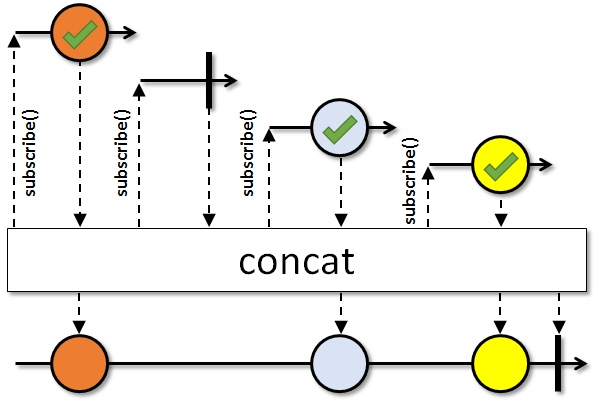
- Backpressure:
- The returned
Flowablehonors the backpressure of the downstream consumer. - Scheduler:
concatdoes not operate by default on a particularScheduler.
Parameters
| source1 | a MaybeSource to be concatenated |
|---|---|
| source2 | a MaybeSource to be concatenated |
Returns
- a Flowable that emits items emitted by the two source MaybeSources, one after the other.
public static Flowable<T> concat (MaybeSource<? extends T> source1, MaybeSource<? extends T> source2, MaybeSource<? extends T> source3)
Returns a Flowable that emits the items emitted by three MaybeSources, one after the other.

- Backpressure:
- The returned
Flowablehonors the backpressure of the downstream consumer. - Scheduler:
concatdoes not operate by default on a particularScheduler.
Parameters
| source1 | a MaybeSource to be concatenated |
|---|---|
| source2 | a MaybeSource to be concatenated |
| source3 | a MaybeSource to be concatenated |
Returns
- a Flowable that emits items emitted by the three source MaybeSources, one after the other.
public static Flowable<T> concat (Iterable<? extends MaybeSource<? extends T>> sources)
Concatenate the single values, in a non-overlapping fashion, of the MaybeSource sources provided by an Iterable sequence.
- Backpressure:
- The returned
Flowablehonors the backpressure of the downstream consumer. - Scheduler:
concatdoes not operate by default on a particularScheduler.
Parameters
| sources | the Iterable sequence of MaybeSource instances |
|---|
Returns
- the new Flowable instance
public static Flowable<T> concat (Publisher<? extends MaybeSource<? extends T>> sources)
Concatenate the single values, in a non-overlapping fashion, of the MaybeSource sources provided by a Publisher sequence.
- Backpressure:
- The returned
Flowablehonors the backpressure of the downstream consumer and expects thePublisherto honor backpressure as well. If the sourcesPublisherviolates this, aMissingBackpressureExceptionis signalled. - Scheduler:
concatdoes not operate by default on a particularScheduler.
Parameters
| sources | the Publisher of MaybeSource instances |
|---|
Returns
- the new Flowable instance
public static Flowable<T> concat (Publisher<? extends MaybeSource<? extends T>> sources, int prefetch)
Concatenate the single values, in a non-overlapping fashion, of the MaybeSource sources provided by a Publisher sequence.
- Backpressure:
- The returned
Flowablehonors the backpressure of the downstream consumer and expects thePublisherto honor backpressure as well. If the sourcesPublisherviolates this, aMissingBackpressureExceptionis signalled. - Scheduler:
concatdoes not operate by default on a particularScheduler.
Parameters
| sources | the Publisher of MaybeSource instances |
|---|---|
| prefetch | the number of MaybeSources to prefetch from the Publisher |
Returns
- the new Flowable instance
public static Flowable<T> concat (MaybeSource<? extends T> source1, MaybeSource<? extends T> source2, MaybeSource<? extends T> source3, MaybeSource<? extends T> source4)
Returns a Flowable that emits the items emitted by four MaybeSources, one after the other.

- Backpressure:
- The returned
Flowablehonors the backpressure of the downstream consumer. - Scheduler:
concatdoes not operate by default on a particularScheduler.
Parameters
| source1 | a MaybeSource to be concatenated |
|---|---|
| source2 | a MaybeSource to be concatenated |
| source3 | a MaybeSource to be concatenated |
| source4 | a MaybeSource to be concatenated |
Returns
- a Flowable that emits items emitted by the four source MaybeSources, one after the other.
public static Flowable<T> concatArray (MaybeSource...<? extends T> sources)
Concatenate the single values, in a non-overlapping fashion, of the MaybeSource sources in the array.
- Backpressure:
- The returned
Flowablehonors the backpressure of the downstream consumer. - Scheduler:
concatArraydoes not operate by default on a particularScheduler.
Parameters
| sources | the array of MaybeSource instances |
|---|
Returns
- the new Flowable instance
public static Flowable<T> concatArrayDelayError (MaybeSource...<? extends T> sources)
Concatenates a variable number of MaybeSource sources and delays errors from any of them till all terminate.
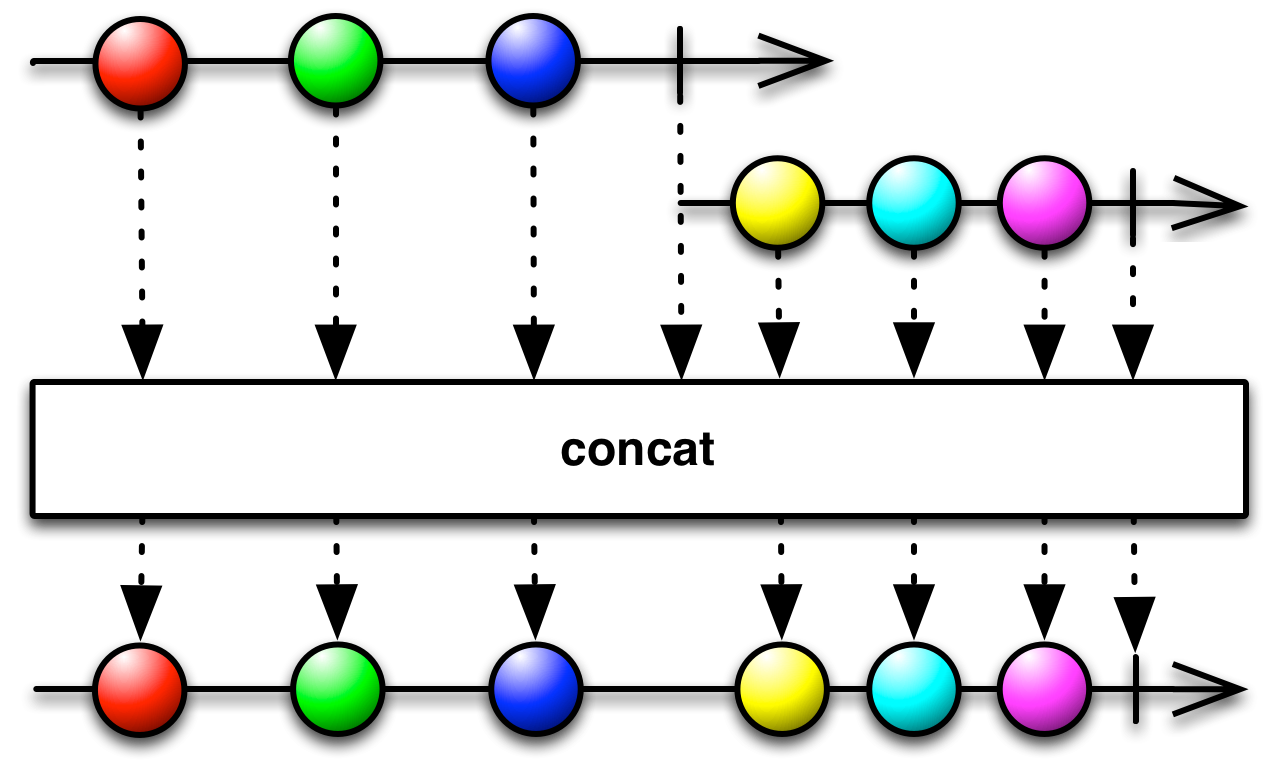
- Backpressure:
- The operator honors backpressure from downstream.
- Scheduler:
concatArrayDelayErrordoes not operate by default on a particularScheduler.
Parameters
| sources | the array of sources |
|---|
Returns
- the new Flowable instance
Throws
| NullPointerException | if sources is null |
|---|
public static Flowable<T> concatArrayEager (MaybeSource...<? extends T> sources)
Concatenates a sequence of MaybeSource eagerly into a single stream of values.
Eager concatenation means that once a subscriber subscribes, this operator subscribes to all of the source MaybeSources. The operator buffers the value emitted by these MaybeSources and then drains them in order, each one after the previous one completes.
- Backpressure:
- The operator honors backpressure from downstream.
- Scheduler:
- This method does not operate by default on a particular
Scheduler.
Parameters
| sources | a sequence of MaybeSources that need to be eagerly concatenated |
|---|
Returns
- the new Flowable instance with the specified concatenation behavior
public static Flowable<T> concatDelayError (Publisher<? extends MaybeSource<? extends T>> sources)
Concatenates the Publisher sequence of Publishers into a single sequence by subscribing to each inner Publisher, one after the other, one at a time and delays any errors till the all inner and the outer Publishers terminate.
- Backpressure:
concatDelayErrorfully supports backpressure.- Scheduler:
concatDelayErrordoes not operate by default on a particularScheduler.
Parameters
| sources | the Publisher sequence of Publishers |
|---|
Returns
- the new Publisher with the concatenating behavior
public static Flowable<T> concatDelayError (Iterable<? extends MaybeSource<? extends T>> sources)
Concatenates the Iterable sequence of MaybeSources into a single sequence by subscribing to each MaybeSource, one after the other, one at a time and delays any errors till the all inner MaybeSources terminate.
- Backpressure:
- The operator honors backpressure from downstream.
- Scheduler:
concatDelayErrordoes not operate by default on a particularScheduler.
Parameters
| sources | the Iterable sequence of MaybeSources |
|---|
Returns
- the new Flowable with the concatenating behavior
public static Flowable<T> concatEager (Iterable<? extends MaybeSource<? extends T>> sources)
Concatenates a sequence of MaybeSources eagerly into a single stream of values.
Eager concatenation means that once a subscriber subscribes, this operator subscribes to all of the source MaybeSources. The operator buffers the values emitted by these MaybeSources and then drains them in order, each one after the previous one completes.
- Backpressure:
- Backpressure is honored towards the downstream.
- Scheduler:
- This method does not operate by default on a particular
Scheduler.
Parameters
| sources | a sequence of MaybeSource that need to be eagerly concatenated |
|---|
Returns
- the new Flowable instance with the specified concatenation behavior
public static Flowable<T> concatEager (Publisher<? extends MaybeSource<? extends T>> sources)
Concatenates a Publisher sequence of Publishers eagerly into a single stream of values.
Eager concatenation means that once a subscriber subscribes, this operator subscribes to all of the emitted source Publishers as they are observed. The operator buffers the values emitted by these Publishers and then drains them in order, each one after the previous one completes.
- Backpressure:
- Backpressure is honored towards the downstream and the outer Publisher is
expected to support backpressure. Violating this assumption, the operator will
signal
MissingBackpressureException. - Scheduler:
- This method does not operate by default on a particular
Scheduler.
Parameters
| sources | a sequence of Publishers that need to be eagerly concatenated |
|---|
Returns
- the new Publisher instance with the specified concatenation behavior
public final Maybe<R> concatMap (Function<? super T, ? extends MaybeSource<? extends R>> mapper)
Returns a Maybe that is based on applying a specified function to the item emitted by the source Maybe, where that function returns a MaybeSource.
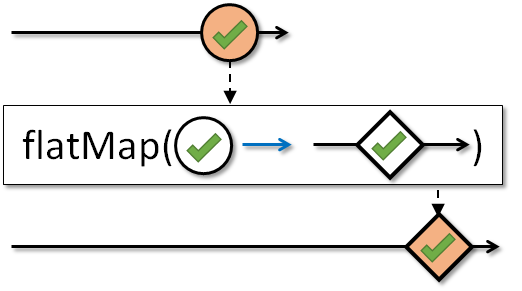
- Scheduler:
concatMapdoes not operate by default on a particularScheduler.
Note that flatMap and concatMap for Maybe is the same operation.
Parameters
| mapper | a function that, when applied to the item emitted by the source Maybe, returns a MaybeSource |
|---|
Returns
- the Maybe returned from
funcwhen applied to the item emitted by the source Maybe
public final Flowable<T> concatWith (MaybeSource<? extends T> other)
Returns a Flowable that emits the items emitted from the current MaybeSource, then the next, one after the other, without interleaving them.

- Backpressure:
- The operator honors backpressure from downstream.
- Scheduler:
concatWithdoes not operate by default on a particularScheduler.
Parameters
| other | a MaybeSource to be concatenated after the current |
|---|
Returns
- a Flowable that emits items emitted by the two source MaybeSources, one after the other, without interleaving them
public final Single<Boolean> contains (Object item)
Returns a Single that emits a Boolean that indicates whether the source Maybe emitted a specified item.
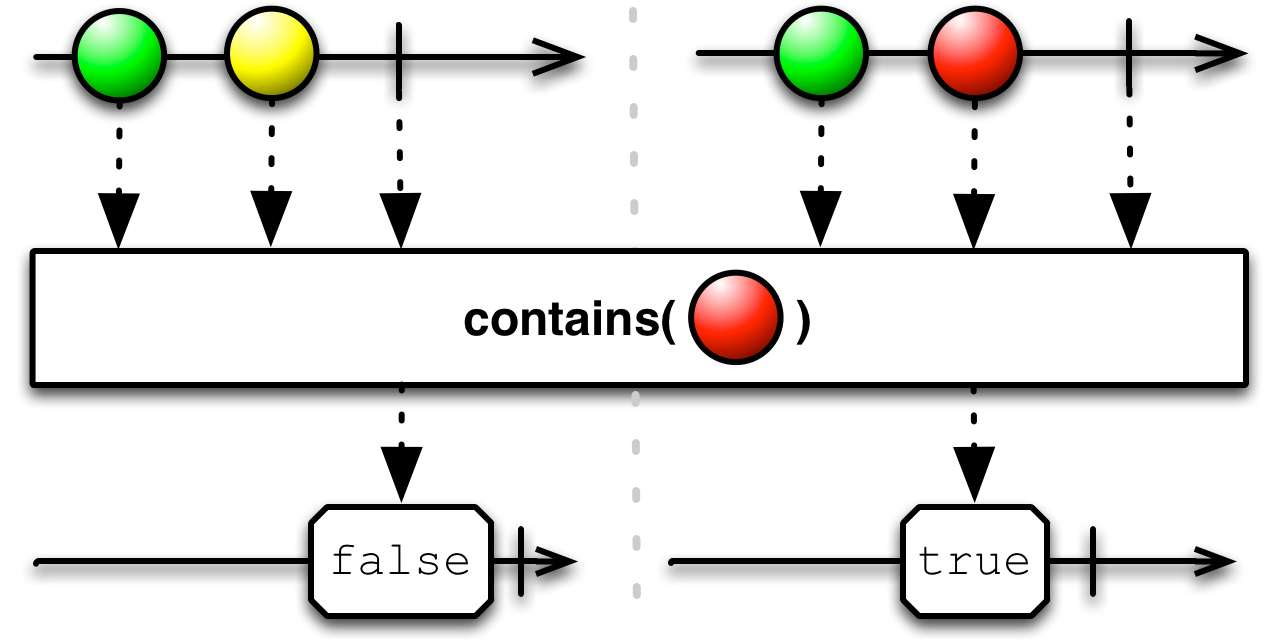
- Scheduler:
containsdoes not operate by default on a particularScheduler.
Parameters
| item | the item to search for in the emissions from the source Maybe, not null |
|---|
Returns
- a Single that emits
trueif the specified item is emitted by the source Maybe, orfalseif the source Maybe completes without emitting that item
public final Single<Long> count ()
Returns a Maybe that counts the total number of items emitted (0 or 1) by the source Maybe and emits this count as a 64-bit Long.
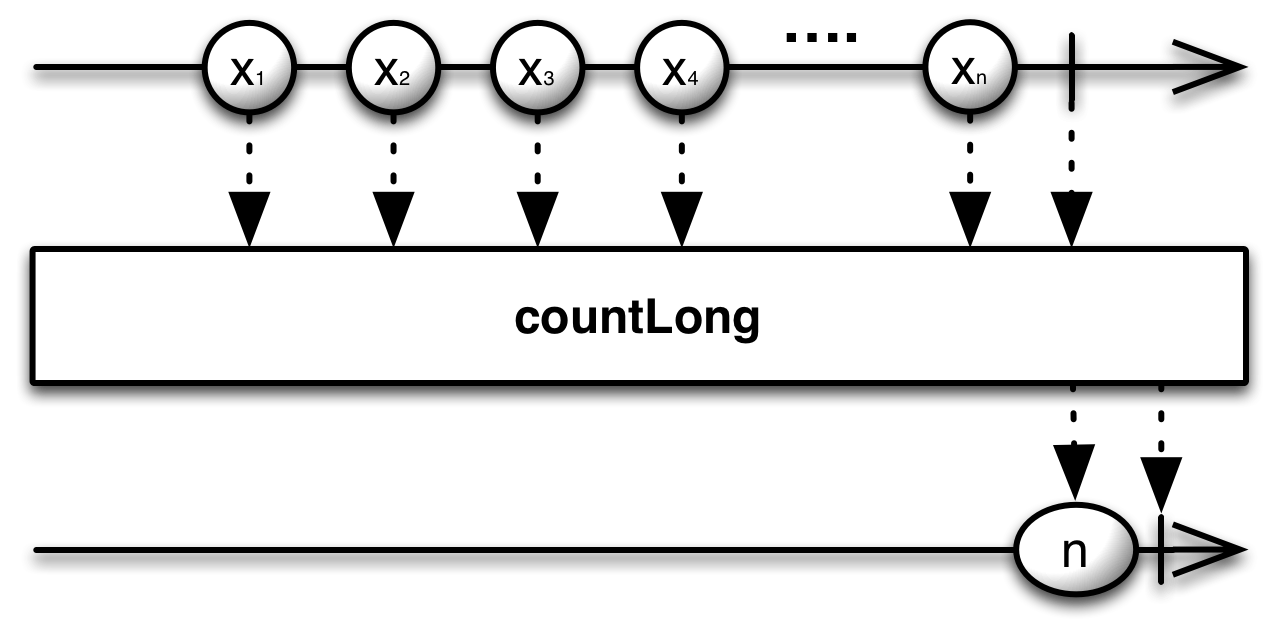
- Scheduler:
countdoes not operate by default on a particularScheduler.
Returns
- a Single that emits a single item: the number of items emitted by the source Maybe as a 64-bit Long item
public static Maybe<T> create (MaybeOnSubscribe<T> onSubscribe)
Provides an API (via a cold Maybe) that bridges the reactive world with the callback-style world.
Example:
Maybe.<Event>create(emitter -> {
Callback listener = new Callback() {
@Override
public void onEvent(Event e) {
if (e.isNothing()) {
emitter.onComplete();
} else {
emitter.onSuccess(e);
}
}
@Override
public void onFailure(Exception e) {
emitter.onError(e);
}
};
AutoCloseable c = api.someMethod(listener);
emitter.setCancellable(c::close);
});
- Scheduler:
createdoes not operate by default on a particularScheduler.
Parameters
| onSubscribe | the emitter that is called when a MaybeObserver subscribes to the returned Maybe |
|---|
Returns
- the new Maybe instance
See Also
public final Maybe<T> defaultIfEmpty (T defaultItem)
Returns a Maybe that emits the item emitted by the source Maybe or a specified default item if the source Maybe is empty.
Note that the result Maybe is semantically equivalent to a Single, since it's guaranteed
to emit exactly one item or an error. See toSingle(Object) for a method with equivalent
behavior which returns a Single.
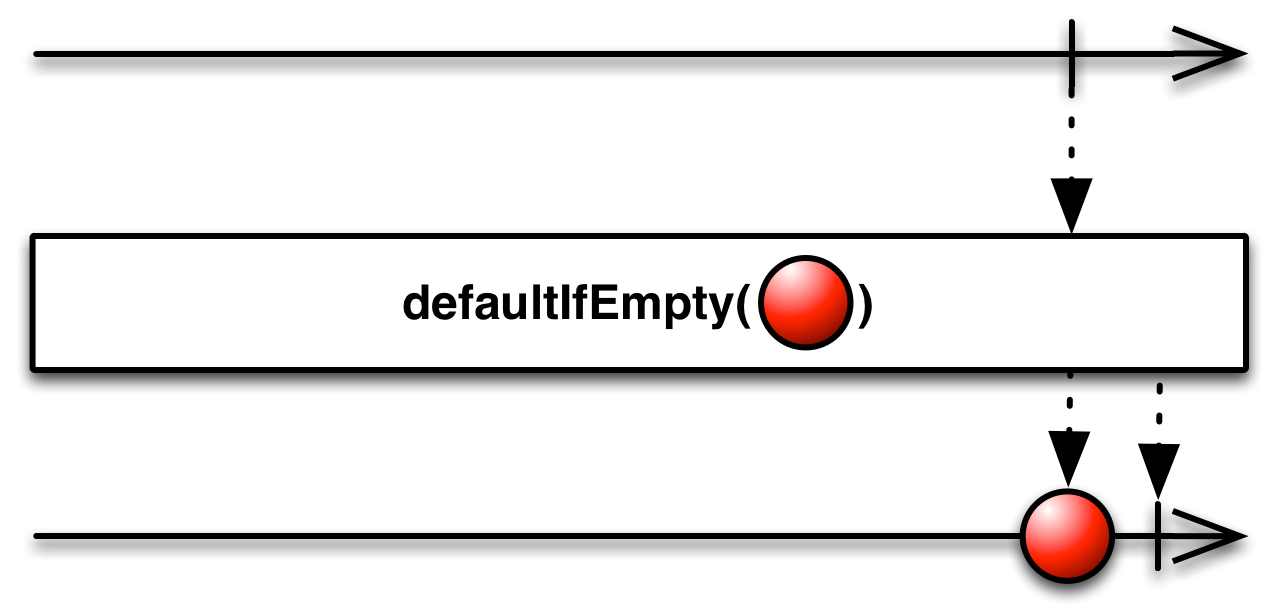
- Scheduler:
defaultIfEmptydoes not operate by default on a particularScheduler.
Parameters
| defaultItem | the item to emit if the source Maybe emits no items |
|---|
Returns
- a Maybe that emits either the specified default item if the source Maybe emits no items, or the items emitted by the source Maybe
public static Maybe<T> defer (Callable<? extends MaybeSource<? extends T>> maybeSupplier)
Calls a Callable for each individual MaybeObserver to return the actual MaybeSource source to be subscribed to.
- Scheduler:
deferdoes not operate by default on a particularScheduler.
Parameters
| maybeSupplier | the Callable that is called for each individual MaybeObserver and returns a MaybeSource instance to subscribe to |
|---|
Returns
- the new Maybe instance
public final Maybe<T> delay (Publisher<U> delayIndicator)
Delays the emission of this Maybe until the given Publisher signals an item or completes.

- Backpressure:
- The
delayIndicatoris consumed in an unbounded manner but is cancelled after the first item it produces. - Scheduler:
- This version of
delaydoes not operate by default on a particularScheduler.
Parameters
| delayIndicator | the Publisher that gets subscribed to when this Maybe signals an event and that signal is emitted when the Publisher signals an item or completes |
|---|
Returns
- the new Maybe instance
public final Maybe<T> delay (long delay, TimeUnit unit)
Returns a Maybe that signals the events emitted by the source Maybe shifted forward in time by a specified delay.
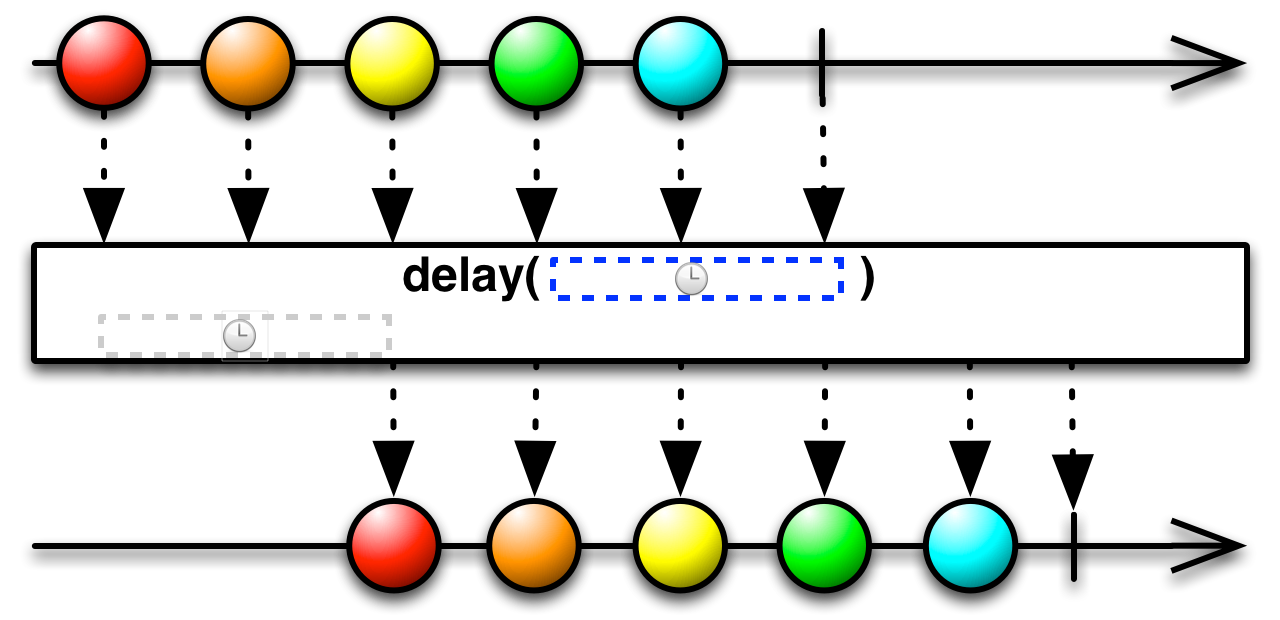
- Scheduler:
- This version of
delayoperates by default on thecomputationScheduler.
Parameters
| delay | the delay to shift the source by |
|---|---|
| unit | the TimeUnit in which period is defined |
Returns
- the new Maybe instance
public final Maybe<T> delay (long delay, TimeUnit unit, Scheduler scheduler)
Returns a Maybe that signals the events emitted by the source Maybe shifted forward in time by a specified delay running on the specified Scheduler.
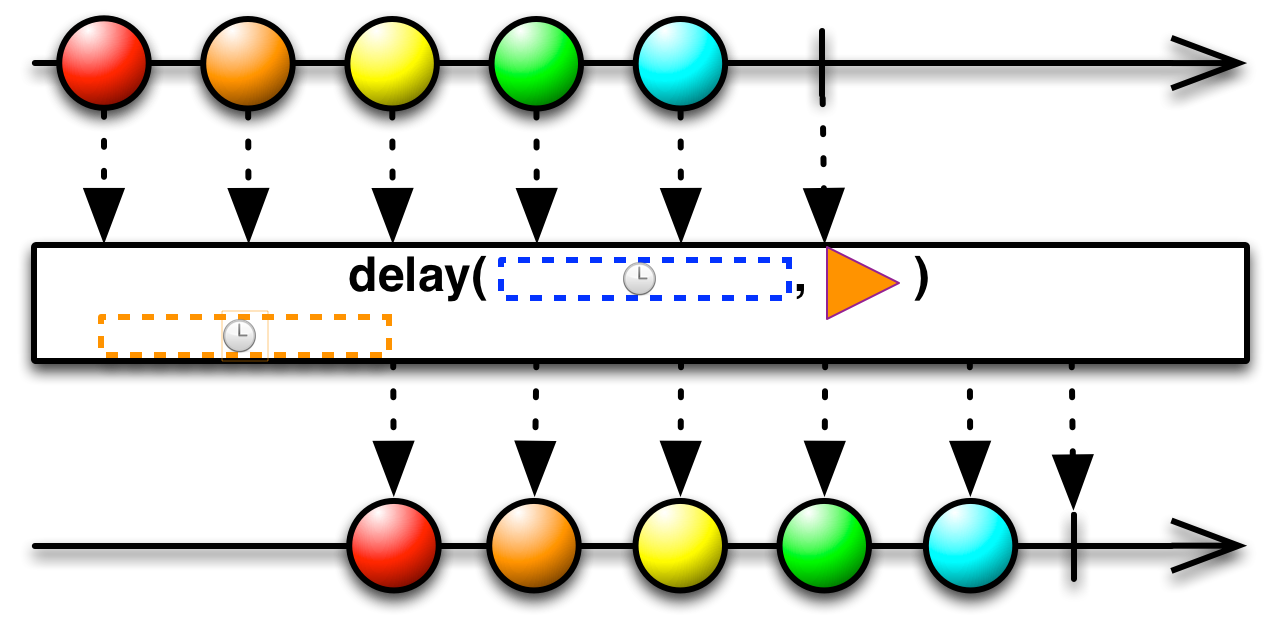
- Scheduler:
- you specify which
Schedulerthis operator will use
Parameters
| delay | the delay to shift the source by |
|---|---|
| unit | the time unit of delay |
| scheduler | the Scheduler to use for delaying |
Returns
- the new Maybe instance
public final Maybe<T> delaySubscription (Publisher<U> subscriptionIndicator)
Returns a Maybe that delays the subscription to this Maybe until the other Publisher emits an element or completes normally.
- Backpressure:
- The
Publishersource is consumed in an unbounded fashion (without applying backpressure). - Scheduler:
- This method does not operate by default on a particular
Scheduler.
Parameters
| subscriptionIndicator | the other Publisher that should trigger the subscription to this Publisher. |
|---|
Returns
- a Maybe that delays the subscription to this Maybe until the other Publisher emits an element or completes normally.
public final Maybe<T> delaySubscription (long delay, TimeUnit unit, Scheduler scheduler)
Returns a Maybe that delays the subscription to the source Maybe by a given amount of time, both waiting and subscribing on a given Scheduler.
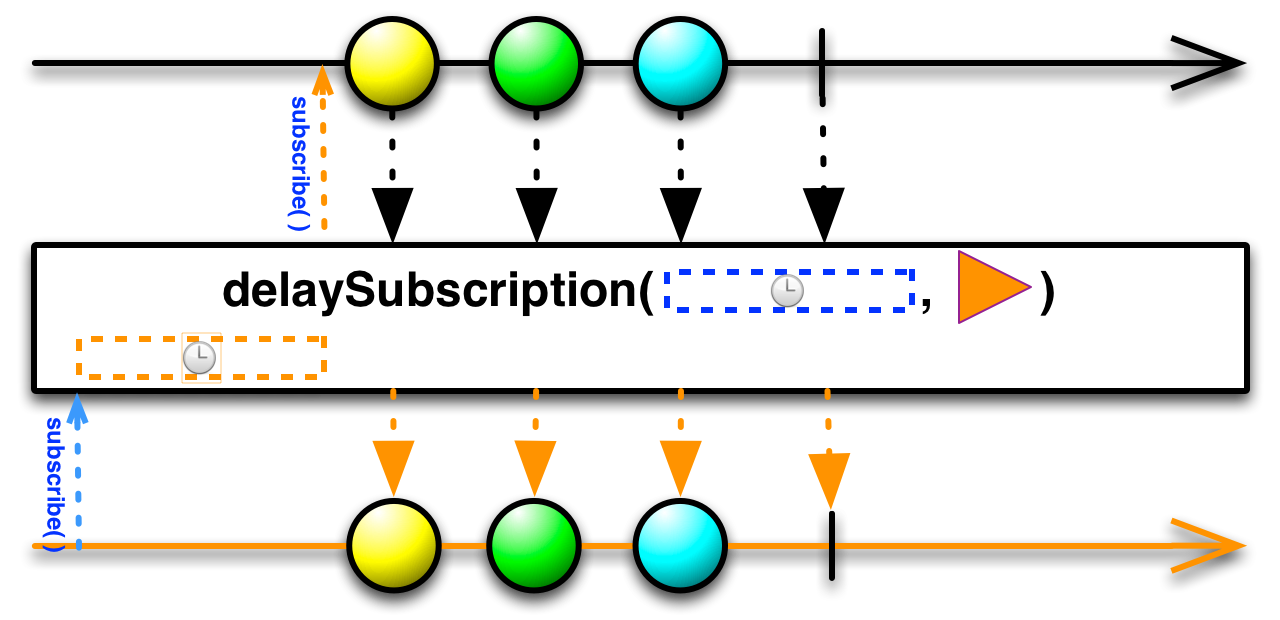
- Scheduler:
- You specify which
Schedulerthis operator will use
Parameters
| delay | the time to delay the subscription |
|---|---|
| unit | the time unit of delay |
| scheduler | the Scheduler on which the waiting and subscription will happen |
Returns
- a Maybe that delays the subscription to the source Maybe by a given amount, waiting and subscribing on the given Scheduler
public final Maybe<T> delaySubscription (long delay, TimeUnit unit)
Returns a Maybe that delays the subscription to the source Maybe by a given amount of time.
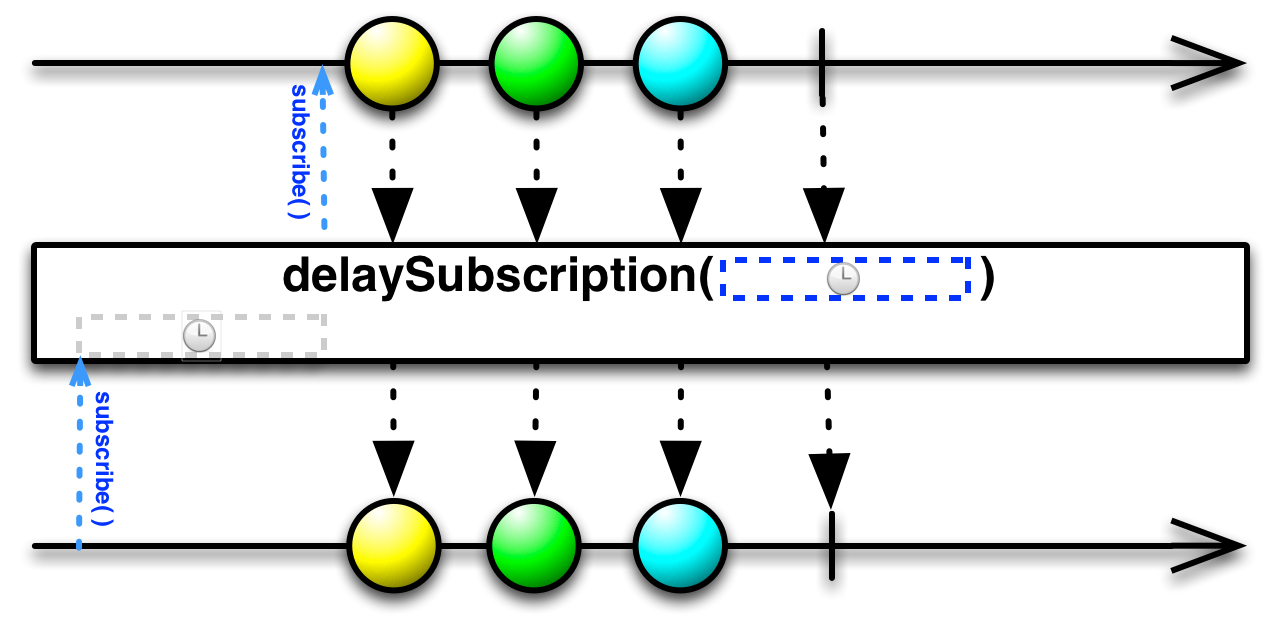
- Scheduler:
- This version of
delaySubscriptionoperates by default on thecomputationScheduler.
Parameters
| delay | the time to delay the subscription |
|---|---|
| unit | the time unit of delay |
Returns
- a Maybe that delays the subscription to the source Maybe by the given amount
public final Maybe<T> doAfterSuccess (Consumer<? super T> onAfterSuccess)
Calls the specified consumer with the success item after this item has been emitted to the downstream.
Note that the onAfterNext action is shared between subscriptions and as such
should be thread-safe.
- Scheduler:
doAfterSuccessdoes not operate by default on a particularScheduler.
History: 2.0.1 - experimental
Parameters
| onAfterSuccess | the Consumer that will be called after emitting an item from upstream to the downstream |
|---|
Returns
- the new Maybe instance
public final Maybe<T> doAfterTerminate (Action onAfterTerminate)
Registers an Action to be called when this Maybe invokes either
onSuccess,
onComplete or onError.
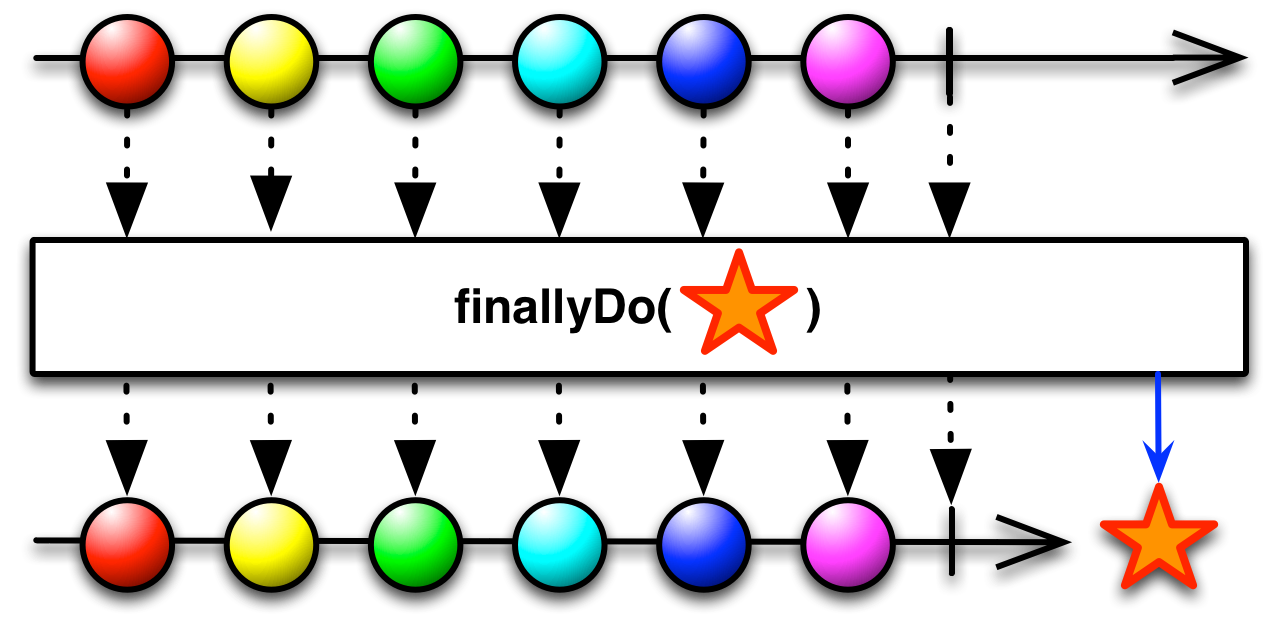
- Scheduler:
doAfterTerminatedoes not operate by default on a particularScheduler.
Parameters
| onAfterTerminate | an Action to be invoked when the source Maybe finishes |
|---|
Returns
- a Maybe that emits the same items as the source Maybe, then invokes the
Action
public final Maybe<T> doFinally (Action onFinally)
Calls the specified action after this Maybe signals onSuccess, onError or onComplete or gets disposed by the downstream.
In case of a race between a terminal event and a dispose call, the provided onFinally action
is executed once per subscription.
Note that the onFinally action is shared between subscriptions and as such
should be thread-safe.
- Scheduler:
doFinallydoes not operate by default on a particularScheduler.
History: 2.0.1 - experimental
Parameters
| onFinally | the action called when this Maybe terminates or gets cancelled |
|---|
Returns
- the new Maybe instance
public final Maybe<T> doOnComplete (Action onComplete)
Modifies the source Maybe so that it invokes an action when it calls onComplete.
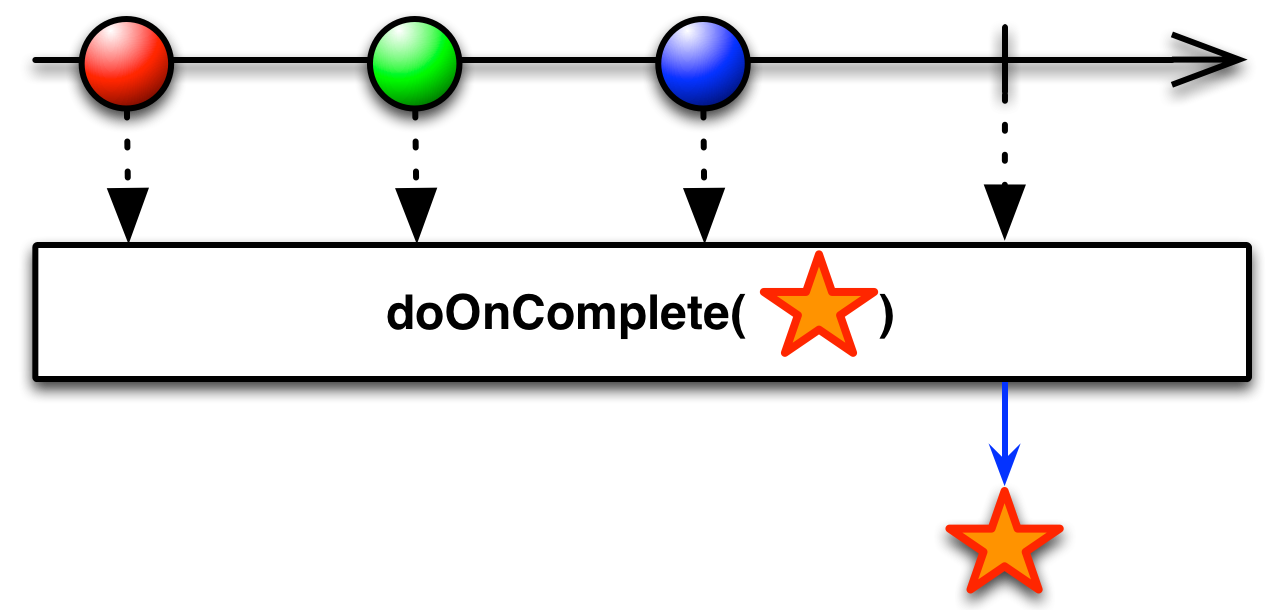
- Scheduler:
doOnCompletedoes not operate by default on a particularScheduler.
Parameters
| onComplete | the action to invoke when the source Maybe calls onComplete |
|---|
Returns
- the new Maybe with the side-effecting behavior applied
public final Maybe<T> doOnDispose (Action onDispose)
Calls the shared Action if a MaybeObserver subscribed to the current Maybe
disposes the common Disposable it received via onSubscribe.
- Scheduler:
doOnDisposedoes not operate by default on a particularScheduler.
Parameters
| onDispose | the action called when the subscription is cancelled (disposed) |
|---|
Returns
- the new Maybe instance
Throws
| NullPointerException | if onDispose is null |
|---|
public final Maybe<T> doOnError (Consumer<? super Throwable> onError)
Calls the shared consumer with the error sent via onError for each MaybeObserver that subscribes to the current Maybe.
- Scheduler:
doOnErrordoes not operate by default on a particularScheduler.
Parameters
| onError | the consumer called with the success value of onError |
|---|
Returns
- the new Maybe instance
public final Maybe<T> doOnEvent (BiConsumer<? super T, ? super Throwable> onEvent)
Calls the given onEvent callback with the (success value, null) for an onSuccess, (null, throwable) for an onError or (null, null) for an onComplete signal from this Maybe before delivering said signal to the downstream.
Exceptions thrown from the callback will override the event so the downstream receives the error instead of the original signal.
- Scheduler:
doOnEventdoes not operate by default on a particularScheduler.
Parameters
| onEvent | the callback to call with the terminal event tuple |
|---|
Returns
- the new Maybe instance
public final Maybe<T> doOnSubscribe (Consumer<? super Disposable> onSubscribe)
Calls the shared consumer with the Disposable sent through the onSubscribe for each MaybeObserver that subscribes to the current Maybe.
- Scheduler:
doOnSubscribedoes not operate by default on a particularScheduler.
Parameters
| onSubscribe | the consumer called with the Disposable sent via onSubscribe |
|---|
Returns
- the new Maybe instance
public final Maybe<T> doOnSuccess (Consumer<? super T> onSuccess)
Calls the shared consumer with the success value sent via onSuccess for each MaybeObserver that subscribes to the current Maybe.
- Scheduler:
doOnSuccessdoes not operate by default on a particularScheduler.
Parameters
| onSuccess | the consumer called with the success value of onSuccess |
|---|
Returns
- the new Maybe instance
public static Maybe<T> empty ()
Returns a (singleton) Maybe instance that calls onComplete
immediately.

- Scheduler:
emptydoes not operate by default on a particularScheduler.
Returns
- the new Maybe instance
public static Maybe<T> error (Throwable exception)
Returns a Maybe that invokes a subscriber's onError method when the
subscriber subscribes to it.
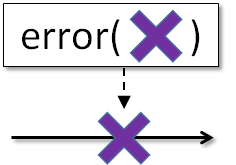
- Scheduler:
errordoes not operate by default on a particularScheduler.
Parameters
| exception | the particular Throwable to pass to onError |
|---|
Returns
- a Maybe that invokes the subscriber's
onErrormethod when the subscriber subscribes to it
public static Maybe<T> error (Callable<? extends Throwable> supplier)
Returns a Maybe that invokes a MaybeObserver's onError method when the
MaybeObserver subscribes to it.

- Scheduler:
errordoes not operate by default on a particularScheduler.
Parameters
| supplier | a Callable factory to return a Throwable for each individual MaybeObserver |
|---|
Returns
- a Maybe that invokes the
MaybeObserver'sonErrormethod when the MaybeObserver subscribes to it
public final Maybe<T> filter (Predicate<? super T> predicate)
Filters the success item of the Maybe via a predicate function and emitting it if the predicate returns true, completing otherwise.

- Scheduler:
filterdoes not operate by default on a particularScheduler.
Parameters
| predicate | a function that evaluates the item emitted by the source Maybe, returning true
if it passes the filter |
|---|
Returns
- a Maybe that emit the item emitted by the source Maybe that the filter
evaluates as
true
public final Maybe<R> flatMap (Function<? super T, ? extends MaybeSource<? extends U>> mapper, BiFunction<? super T, ? super U, ? extends R> resultSelector)
Returns a Maybe that emits the results of a specified function to the pair of values emitted by the source Maybe and a specified mapped MaybeSource.
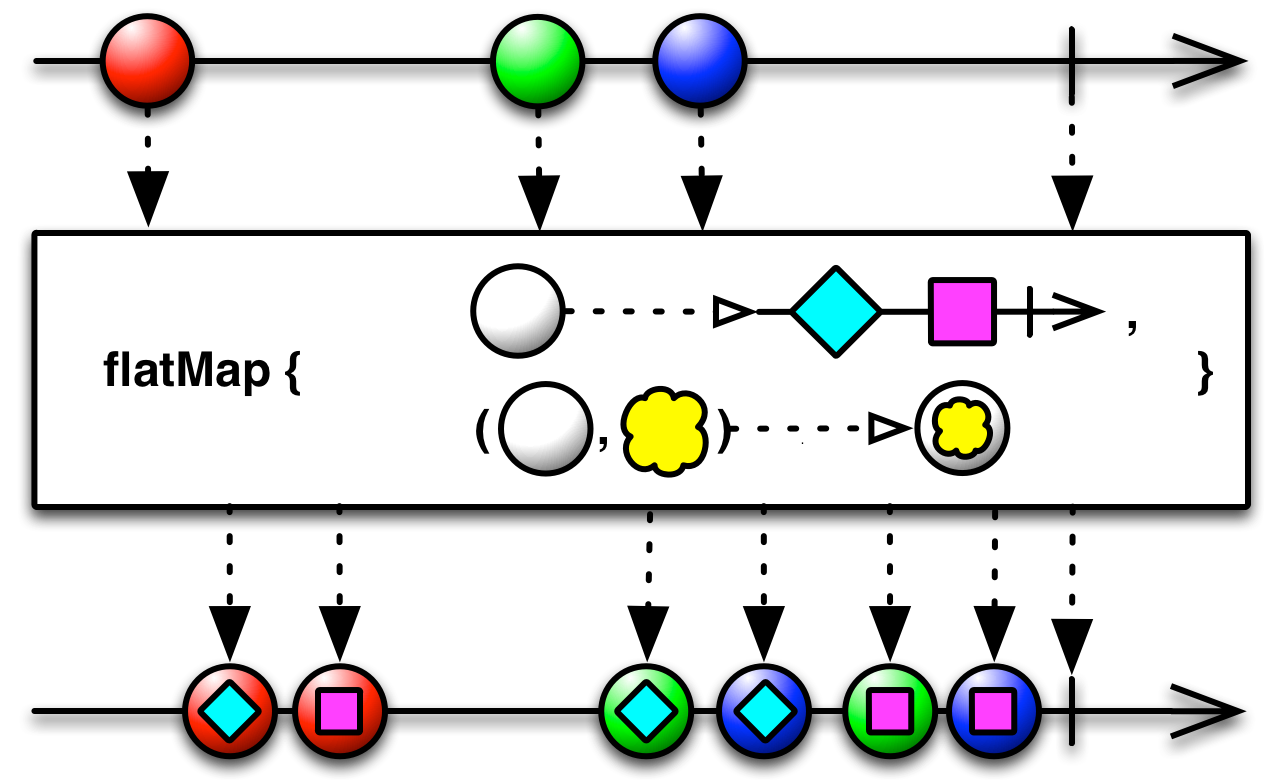
- Scheduler:
flatMapdoes not operate by default on a particularScheduler.
Parameters
| mapper | a function that returns a MaybeSource for the item emitted by the source Maybe |
|---|---|
| resultSelector | a function that combines one item emitted by each of the source and collection MaybeSource and returns an item to be emitted by the resulting MaybeSource |
Returns
- the new Maybe instance
public final Maybe<R> flatMap (Function<? super T, ? extends MaybeSource<? extends R>> onSuccessMapper, Function<? super Throwable, ? extends MaybeSource<? extends R>> onErrorMapper, Callable<? extends MaybeSource<? extends R>> onCompleteSupplier)
Maps the onSuccess, onError or onComplete signals of this Maybe into MaybeSource and emits that MaybeSource's signals
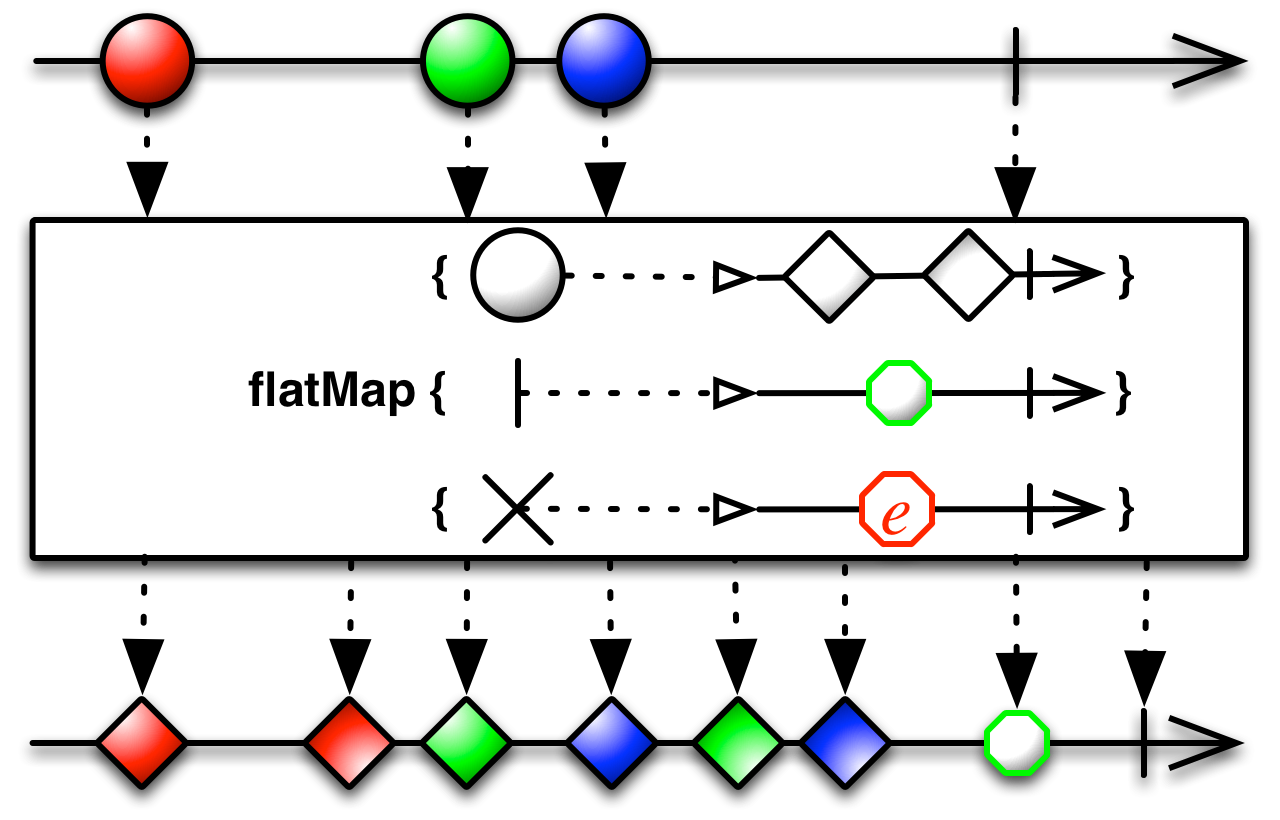
- Scheduler:
flatMapdoes not operate by default on a particularScheduler.
Parameters
| onSuccessMapper | a function that returns a MaybeSource to merge for the onSuccess item emitted by this Maybe |
|---|---|
| onErrorMapper | a function that returns a MaybeSource to merge for an onError notification from this Maybe |
| onCompleteSupplier | a function that returns a MaybeSource to merge for an onComplete notification this Maybe |
Returns
- the new Maybe instance
public final Maybe<R> flatMap (Function<? super T, ? extends MaybeSource<? extends R>> mapper)
Returns a Maybe that is based on applying a specified function to the item emitted by the source Maybe, where that function returns a MaybeSource.

- Scheduler:
flatMapdoes not operate by default on a particularScheduler.
Note that flatMap and concatMap for Maybe is the same operation.
Parameters
| mapper | a function that, when applied to the item emitted by the source Maybe, returns a MaybeSource |
|---|
Returns
- the Maybe returned from
funcwhen applied to the item emitted by the source Maybe
public final Completable flatMapCompletable (Function<? super T, ? extends CompletableSource> mapper)
Returns a Completable that completes based on applying a specified function to the item emitted by the
source Maybe, where that function returns a Completable.
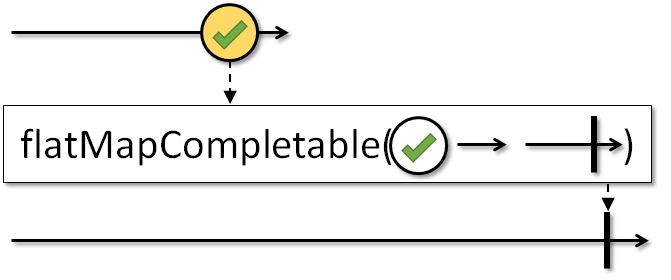
- Scheduler:
flatMapCompletabledoes not operate by default on a particularScheduler.
Parameters
| mapper | a function that, when applied to the item emitted by the source Maybe, returns a Completable |
|---|
Returns
- the Completable returned from
mapperwhen applied to the item emitted by the source Maybe
public final Observable<R> flatMapObservable (Function<? super T, ? extends ObservableSource<? extends R>> mapper)
Returns an Observable that is based on applying a specified function to the item emitted by the source Maybe, where that function returns an ObservableSource.

- Scheduler:
flatMapObservabledoes not operate by default on a particularScheduler.
Parameters
| mapper | a function that, when applied to the item emitted by the source Maybe, returns an ObservableSource |
|---|
Returns
- the Observable returned from
funcwhen applied to the item emitted by the source Maybe
public final Flowable<R> flatMapPublisher (Function<? super T, ? extends Publisher<? extends R>> mapper)
Returns a Flowable that emits items based on applying a specified function to the item emitted by the source Maybe, where that function returns a Publisher.
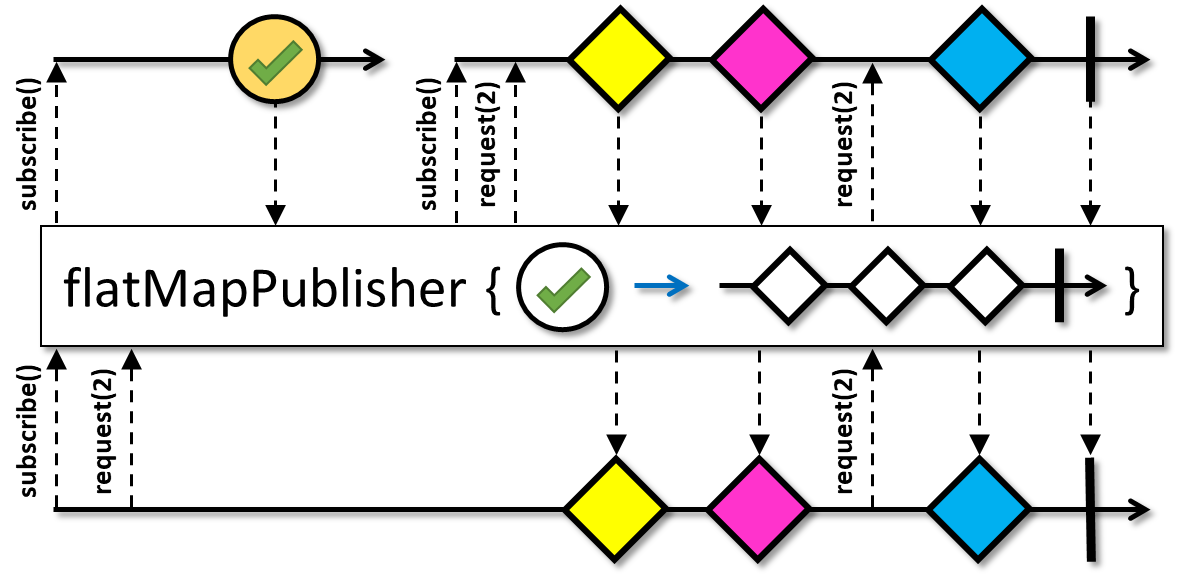
- Backpressure:
- The returned Flowable honors the downstream backpressure.
- Scheduler:
flatMapPublisherdoes not operate by default on a particularScheduler.
Parameters
| mapper | a function that, when applied to the item emitted by the source Maybe, returns an Flowable |
|---|
Returns
- the Flowable returned from
funcwhen applied to the item emitted by the source Maybe
public final Single<R> flatMapSingle (Function<? super T, ? extends SingleSource<? extends R>> mapper)
Returns a Single based on applying a specified function to the item emitted by the
source Maybe, where that function returns a Single.
When this Maybe completes a NoSuchElementException will be thrown.
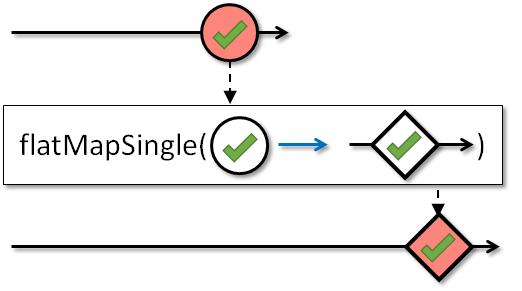
- Scheduler:
flatMapSingledoes not operate by default on a particularScheduler.
Parameters
| mapper | a function that, when applied to the item emitted by the source Maybe, returns a Single |
|---|
Returns
- the Single returned from
mapperwhen applied to the item emitted by the source Maybe
public final Maybe<R> flatMapSingleElement (Function<? super T, ? extends SingleSource<? extends R>> mapper)
Returns a Maybe based on applying a specified function to the item emitted by the
source Maybe, where that function returns a Single.
When this Maybe just completes the resulting Maybe completes as well.

- Scheduler:
flatMapSingleElementdoes not operate by default on a particularScheduler.
History: 2.0.2 - experimental
Parameters
| mapper | a function that, when applied to the item emitted by the source Maybe, returns a Single |
|---|
Returns
- the new Maybe instance
public final Flowable<U> flattenAsFlowable (Function<? super T, ? extends Iterable<? extends U>> mapper)
Returns a Flowable that merges each item emitted by the source Maybe with the values in an Iterable corresponding to that item that is generated by a selector.
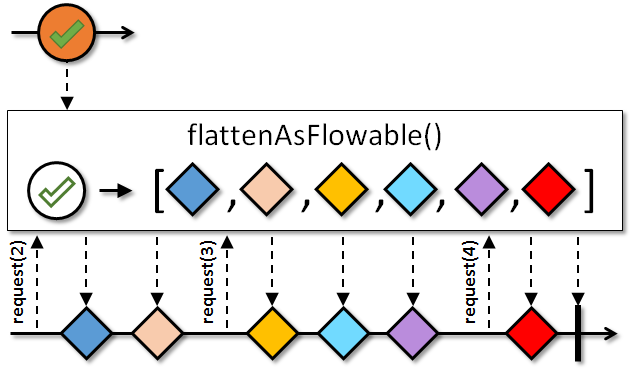
- Backpressure:
- The operator honors backpressure from downstream.
- Scheduler:
flattenAsFlowabledoes not operate by default on a particularScheduler.
Parameters
| mapper | a function that returns an Iterable sequence of values for when given an item emitted by the source Maybe |
|---|
Returns
- the new Flowable instance
public final Observable<U> flattenAsObservable (Function<? super T, ? extends Iterable<? extends U>> mapper)
Returns an Observable that maps a success value into an Iterable and emits its items.
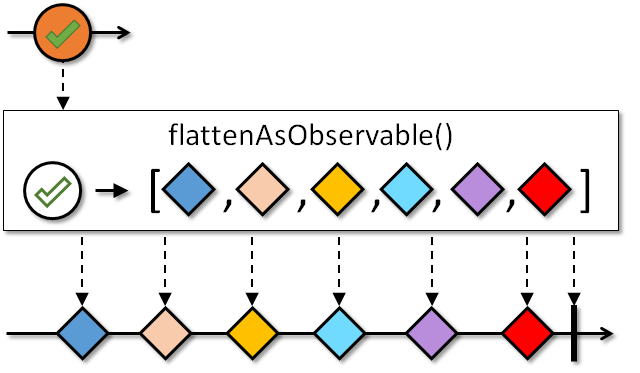
- Scheduler:
flattenAsObservabledoes not operate by default on a particularScheduler.
Parameters
| mapper | a function that returns an Iterable sequence of values for when given an item emitted by the source Maybe |
|---|
Returns
- the new Observable instance
public static Maybe<T> fromAction (Action run)
Returns a Maybe instance that runs the given Action for each subscriber and emits either its exception or simply completes.
- Scheduler:
fromActiondoes not operate by default on a particularScheduler.
Parameters
| run | the runnable to run for each subscriber |
|---|
Returns
- the new Maybe instance
Throws
| NullPointerException | if run is null |
|---|
public static Maybe<T> fromCallable (Callable<? extends T> callable)
Returns a Maybe that invokes passed function and emits its result for each new MaybeObserver that subscribes
while considering null value from the callable as indication for valueless completion.
Allows you to defer execution of passed function until MaybeObserver subscribes to the Maybe.
It makes passed function "lazy".
Result of the function invocation will be emitted by the Maybe.
- Scheduler:
fromCallabledoes not operate by default on a particularScheduler.
Parameters
| callable | function which execution should be deferred, it will be invoked when MaybeObserver will subscribe to the Maybe. |
|---|
Returns
- a
MaybewhoseMaybeObservers' subscriptions trigger an invocation of the given function.
public static Maybe<T> fromCompletable (CompletableSource completableSource)
Wraps a CompletableSource into a Maybe.
- Scheduler:
fromCompletabledoes not operate by default on a particularScheduler.
Parameters
| completableSource | the CompletableSource to convert from |
|---|
Returns
- the new Maybe instance
Throws
| NullPointerException | if completable is null |
|---|
public static Maybe<T> fromFuture (Future<? extends T> future)
Converts a Future into a Maybe, treating a null result as an indication of emptiness.
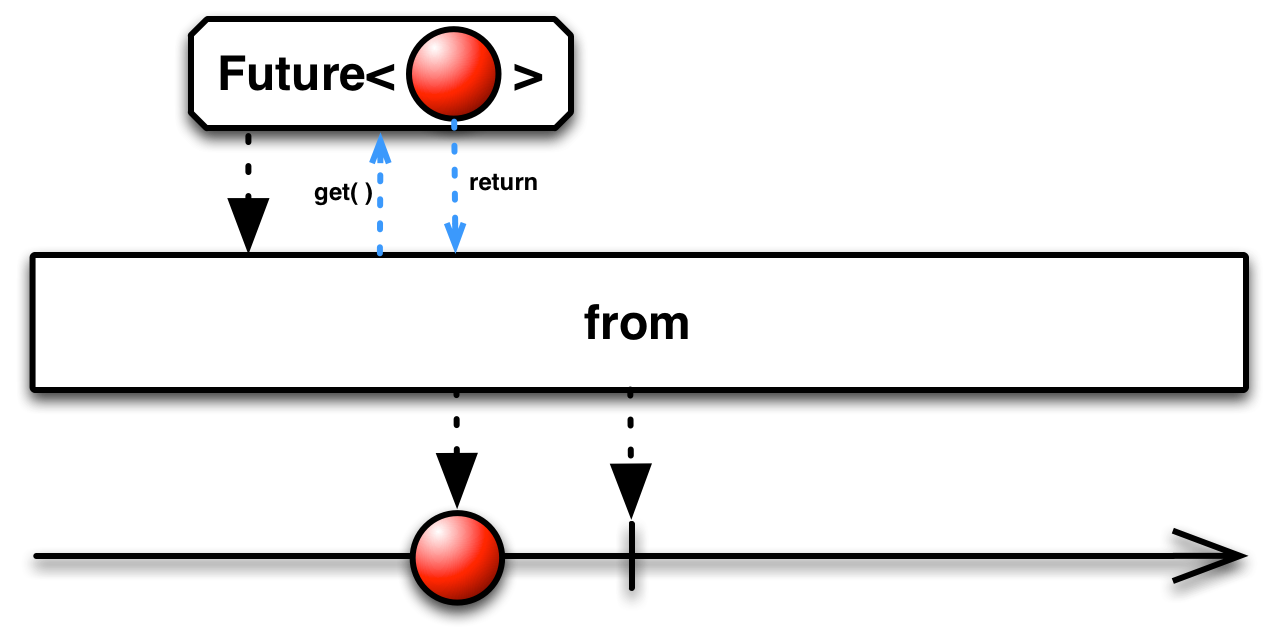
You can convert any object that supports the Future interface into a Maybe that emits the
return value of the get() method of that object, by passing the object into the from
method.
Important note: This Maybe is blocking; you cannot dispose it.
Unlike 1.x, cancelling the Maybe won't cancel the future. If necessary, one can use composition to achieve the
cancellation effect: futureMaybe.doOnDispose(() -> future.cancel(true));.
- Scheduler:
fromFuturedoes not operate by default on a particularScheduler.
Parameters
| future | the source Future |
|---|
Returns
- a Maybe that emits the item from the source
Future
public static Maybe<T> fromFuture (Future<? extends T> future, long timeout, TimeUnit unit)
Converts a Future into a Maybe, with a timeout on the Future.

You can convert any object that supports the Future interface into a Maybe that emits the
return value of the get() method of that object, by passing the object into the fromFuture
method.
Unlike 1.x, cancelling the Maybe won't cancel the future. If necessary, one can use composition to achieve the
cancellation effect: futureMaybe.doOnCancel(() -> future.cancel(true));.
Important note: This Maybe is blocking on the thread it gets subscribed on; you cannot dispose it.
- Scheduler:
fromFuturedoes not operate by default on a particularScheduler.
Parameters
| future | the source Future |
|---|---|
| timeout | the maximum time to wait before calling get |
| unit | the TimeUnit of the timeout argument |
Returns
- a Maybe that emits the item from the source
Future
public static Maybe<T> fromRunnable (Runnable run)
Returns a Maybe instance that runs the given Action for each subscriber and emits either its exception or simply completes.
- Scheduler:
fromRunnabledoes not operate by default on a particularScheduler.
Parameters
| run | the runnable to run for each subscriber |
|---|
Returns
- the new Maybe instance
Throws
| NullPointerException | if run is null |
|---|
public static Maybe<T> fromSingle (SingleSource<T> singleSource)
Wraps a SingleSource into a Maybe.
- Scheduler:
fromSingledoes not operate by default on a particularScheduler.
Parameters
| singleSource | the SingleSource to convert from |
|---|
Returns
- the new Maybe instance
Throws
| NullPointerException | if single is null |
|---|
public final Maybe<T> hide ()
Hides the identity of this Maybe and its Disposable.
Allows preventing certain identity-based optimizations (fusion).
- Scheduler:
hidedoes not operate by default on a particularScheduler.
Returns
- the new Maybe instance
public final Completable ignoreElement ()
Ignores the item emitted by the source Maybe and only calls onComplete or onError.
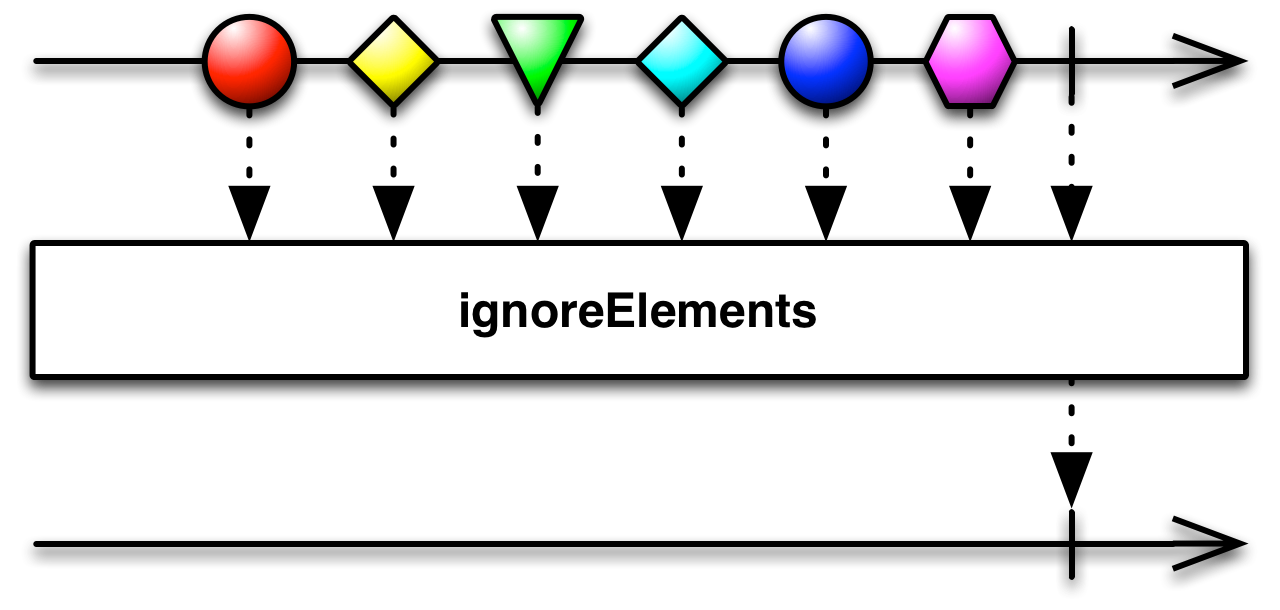
- Scheduler:
ignoreElementdoes not operate by default on a particularScheduler.
Returns
- an empty Completable that only calls
onCompleteoronError, based on which one is called by the source Maybe
public final Single<Boolean> isEmpty ()
Returns a Single that emits true if the source Maybe is empty, otherwise false.
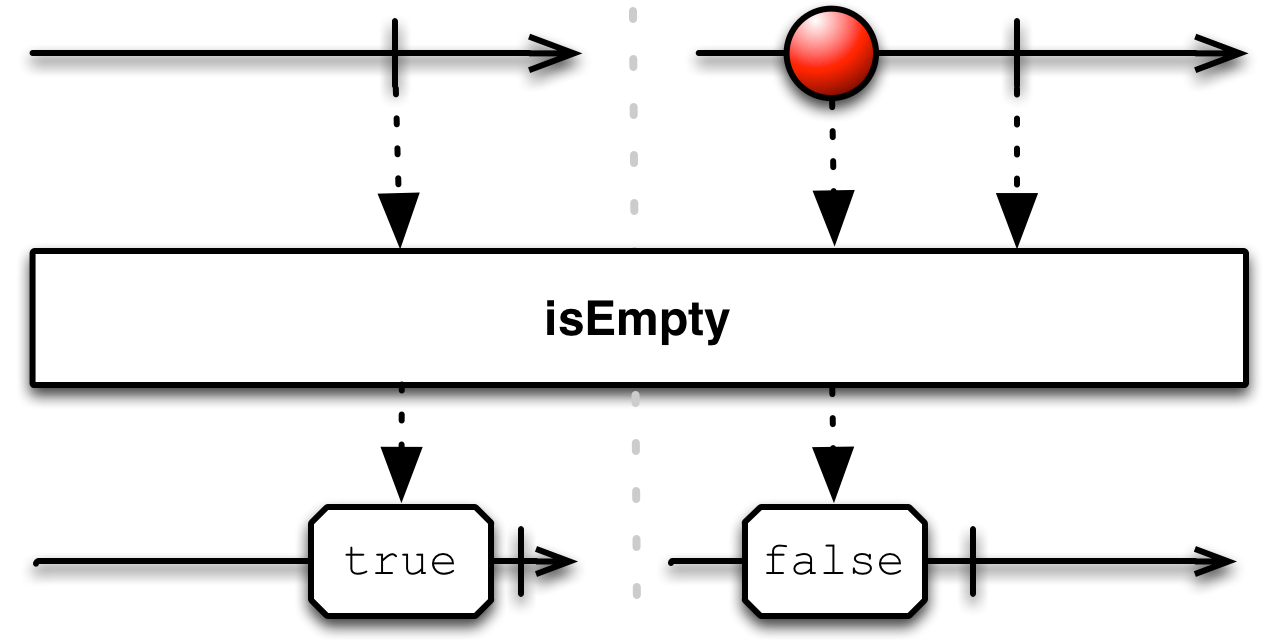
- Scheduler:
isEmptydoes not operate by default on a particularScheduler.
Returns
- a Single that emits a Boolean
public static Maybe<T> just (T item)
Returns a Maybe that emits a specified item.
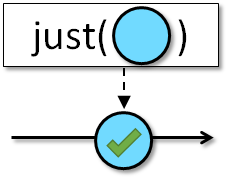
To convert any object into a Maybe that emits that object, pass that object into the
just method.
- Scheduler:
justdoes not operate by default on a particularScheduler.
Parameters
| item | the item to emit |
|---|
Returns
- a
Maybethat emitsitem
public final Maybe<R> lift (MaybeOperator<? extends R, ? super T> lift)
Lifts a function to the current Maybe and returns a new Maybe that when subscribed to will pass the values of the current Maybe through the MaybeOperator function.
In other words, this allows chaining TaskExecutors together on a Maybe for acting on the values within the Maybe.
task.map(...).filter(...).lift(new OperatorA()).lift(new OperatorB(...)).subscribe()
If the operator you are creating is designed to act on the item emitted by a source Maybe, use
lift. If your operator is designed to transform the source Maybe as a whole (for instance, by
applying a particular set of existing RxJava operators to it) use compose(MaybeTransformer).
- Scheduler:
liftdoes not operate by default on a particularScheduler.
Parameters
| lift | the MaybeOperator that implements the Maybe-operating function to be applied to the source Maybe |
|---|
Returns
- a Maybe that is the result of applying the lifted Operator to the source Maybe
public final Maybe<R> map (Function<? super T, ? extends R> mapper)
Returns a Maybe that applies a specified function to the item emitted by the source Maybe and emits the result of this function application.
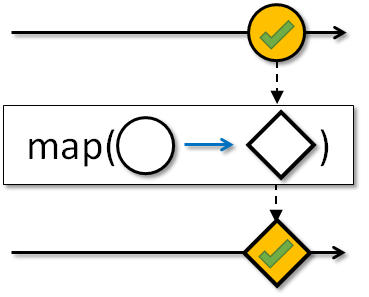
- Scheduler:
mapdoes not operate by default on a particularScheduler.
Parameters
| mapper | a function to apply to the item emitted by the Maybe |
|---|
Returns
- a Maybe that emits the item from the source Maybe, transformed by the specified function
public static Maybe<T> merge (MaybeSource<? extends MaybeSource<? extends T>> source)
Flattens a MaybeSource that emits a MaybeSource into a single MaybeSource that emits the item
emitted by the nested MaybeSource, without any transformation.
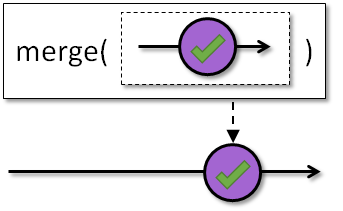
- Scheduler:
mergedoes not operate by default on a particularScheduler.
Parameters
| source | a MaybeSource that emits a MaybeSource |
|---|
Returns
- a
Maybethat emits the item that is the result of flattening theMaybeSourceemitted bysource
public static Flowable<T> merge (Publisher<? extends MaybeSource<? extends T>> sources, int maxConcurrency)
Merges a Flowable sequence of MaybeSource instances into a single Flowable sequence, running at most maxConcurrency MaybeSources at once.
- Backpressure:
- The operator honors backpressure from downstream.
- Scheduler:
mergedoes not operate by default on a particularScheduler.
Parameters
| sources | the Flowable sequence of MaybeSource sources |
|---|---|
| maxConcurrency | the maximum number of concurrently running MaybeSources |
Returns
- the new Flowable instance
public static Flowable<T> merge (Publisher<? extends MaybeSource<? extends T>> sources)
Merges a Flowable sequence of MaybeSource instances into a single Flowable sequence, running all MaybeSources at once.
- Backpressure:
- The operator honors backpressure from downstream.
- Scheduler:
mergedoes not operate by default on a particularScheduler.
Parameters
| sources | the Flowable sequence of MaybeSource sources |
|---|
Returns
- the new Flowable instance
public static Flowable<T> merge (Iterable<? extends MaybeSource<? extends T>> sources)
Merges an Iterable sequence of MaybeSource instances into a single Flowable sequence, running all MaybeSources at once.
- Backpressure:
- The operator honors backpressure from downstream.
- Scheduler:
mergedoes not operate by default on a particularScheduler.
Parameters
| sources | the Iterable sequence of MaybeSource sources |
|---|
Returns
- the new Flowable instance
public static Flowable<T> merge (MaybeSource<? extends T> source1, MaybeSource<? extends T> source2)
Flattens two MaybeSources into a single Flowable, without any transformation.
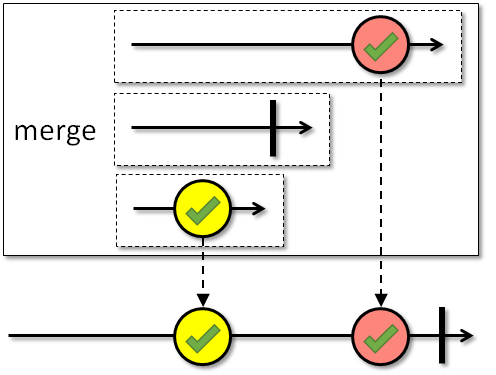
You can combine items emitted by multiple MaybeSources so that they appear as a single Flowable, by
using the merge method.
- Backpressure:
- The operator honors backpressure from downstream.
- Scheduler:
mergedoes not operate by default on a particularScheduler.
Parameters
| source1 | a MaybeSource to be merged |
|---|---|
| source2 | a MaybeSource to be merged |
Returns
- a Flowable that emits all of the items emitted by the source MaybeSources
public static Flowable<T> merge (MaybeSource<? extends T> source1, MaybeSource<? extends T> source2, MaybeSource<? extends T> source3, MaybeSource<? extends T> source4)
Flattens four MaybeSources into a single Flowable, without any transformation.

You can combine items emitted by multiple MaybeSources so that they appear as a single Flowable, by using
the merge method.
- Backpressure:
- The operator honors backpressure from downstream.
- Scheduler:
mergedoes not operate by default on a particularScheduler.
Parameters
| source1 | a MaybeSource to be merged |
|---|---|
| source2 | a MaybeSource to be merged |
| source3 | a MaybeSource to be merged |
| source4 | a MaybeSource to be merged |
Returns
- a Flowable that emits all of the items emitted by the source MaybeSources
public static Flowable<T> merge (MaybeSource<? extends T> source1, MaybeSource<? extends T> source2, MaybeSource<? extends T> source3)
Flattens three MaybeSources into a single Flowable, without any transformation.

You can combine items emitted by multiple MaybeSources so that they appear as a single Flowable, by using
the merge method.
- Backpressure:
- The operator honors backpressure from downstream.
- Scheduler:
mergedoes not operate by default on a particularScheduler.
Parameters
| source1 | a MaybeSource to be merged |
|---|---|
| source2 | a MaybeSource to be merged |
| source3 | a MaybeSource to be merged |
Returns
- a Flowable that emits all of the items emitted by the source MaybeSources
public static Flowable<T> mergeArray (MaybeSource...<? extends T> sources)
Merges an array sequence of MaybeSource instances into a single Flowable sequence, running all MaybeSources at once.
- Backpressure:
- The operator honors backpressure from downstream.
- Scheduler:
mergeArraydoes not operate by default on a particularScheduler.
Parameters
| sources | the array sequence of MaybeSource sources |
|---|
Returns
- the new Flowable instance
public static Flowable<T> mergeArrayDelayError (MaybeSource...<? extends T> sources)
Flattens an array of MaybeSources into one Flowable, in a way that allows a Subscriber to receive all successfully emitted items from each of the source MaybeSources without being interrupted by an error notification from one of them.
This behaves like merge(Publisher) except that if any of the merged MaybeSources notify of an
error via onError, mergeDelayError will refrain from propagating that
error notification until all of the merged MaybeSources have finished emitting items.
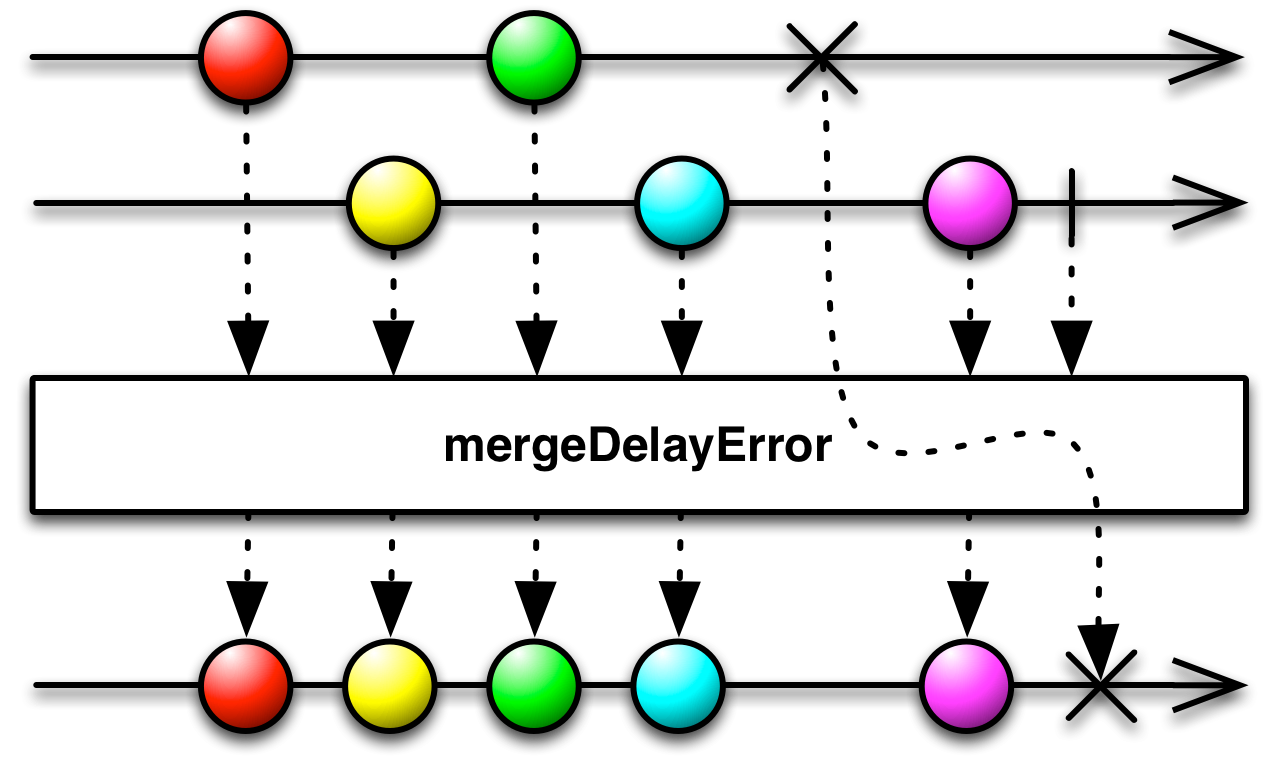
Even if multiple merged MaybeSources send onError notifications, mergeDelayError will only
invoke the onError method of its Subscribers once.
- Backpressure:
- The operator honors backpressure from downstream.
- Scheduler:
mergeArrayDelayErrordoes not operate by default on a particularScheduler.
Parameters
| sources | the Iterable of MaybeSources |
|---|
Returns
- a Flowable that emits items that are the result of flattening the items emitted by the MaybeSources in the Iterable
public static Flowable<T> mergeDelayError (MaybeSource<? extends T> source1, MaybeSource<? extends T> source2, MaybeSource<? extends T> source3)
Flattens three MaybeSource into one Flowable, in a way that allows a Subscriber to receive all successfully emitted items from all of the source MaybeSources without being interrupted by an error notification from one of them.
This behaves like merge(MaybeSource, MaybeSource, MaybeSource) except that if any of the merged
MaybeSources notify of an error via onError, mergeDelayError will refrain
from propagating that error notification until all of the merged MaybeSources have finished emitting
items.

Even if multiple merged MaybeSources send onError notifications, mergeDelayError will only
invoke the onError method of its Subscribers once.
- Backpressure:
- The operator honors backpressure from downstream.
- Scheduler:
mergeDelayErrordoes not operate by default on a particularScheduler.
Parameters
| source1 | a MaybeSource to be merged |
|---|---|
| source2 | a MaybeSource to be merged |
| source3 | a MaybeSource to be merged |
Returns
- a Flowable that emits all of the items that are emitted by the source MaybeSources
public static Flowable<T> mergeDelayError (MaybeSource<? extends T> source1, MaybeSource<? extends T> source2, MaybeSource<? extends T> source3, MaybeSource<? extends T> source4)
Flattens four MaybeSources into one Flowable, in a way that allows a Subscriber to receive all successfully emitted items from all of the source MaybeSources without being interrupted by an error notification from one of them.
This behaves like merge(MaybeSource, MaybeSource, MaybeSource, MaybeSource) except that if any of
the merged MaybeSources notify of an error via onError, mergeDelayError
will refrain from propagating that error notification until all of the merged MaybeSources have finished
emitting items.

Even if multiple merged MaybeSources send onError notifications, mergeDelayError will only
invoke the onError method of its Subscribers once.
- Backpressure:
- The operator honors backpressure from downstream.
- Scheduler:
mergeDelayErrordoes not operate by default on a particularScheduler.
Parameters
| source1 | a MaybeSource to be merged |
|---|---|
| source2 | a MaybeSource to be merged |
| source3 | a MaybeSource to be merged |
| source4 | a MaybeSource to be merged |
Returns
- a Flowable that emits all of the items that are emitted by the source MaybeSources
public static Flowable<T> mergeDelayError (Iterable<? extends MaybeSource<? extends T>> sources)
Flattens an Iterable of MaybeSources into one Flowable, in a way that allows a Subscriber to receive all successfully emitted items from each of the source MaybeSources without being interrupted by an error notification from one of them.
This behaves like merge(Publisher) except that if any of the merged MaybeSources notify of an
error via onError, mergeDelayError will refrain from propagating that
error notification until all of the merged MaybeSources have finished emitting items.

Even if multiple merged MaybeSources send onError notifications, mergeDelayError will only
invoke the onError method of its Subscribers once.
- Backpressure:
- The operator honors backpressure from downstream.
- Scheduler:
mergeDelayErrordoes not operate by default on a particularScheduler.
Parameters
| sources | the Iterable of MaybeSources |
|---|
Returns
- a Flowable that emits items that are the result of flattening the items emitted by the MaybeSources in the Iterable
public static Flowable<T> mergeDelayError (Publisher<? extends MaybeSource<? extends T>> sources)
Flattens a Publisher that emits MaybeSources into one Publisher, in a way that allows a Subscriber to receive all successfully emitted items from all of the source Publishers without being interrupted by an error notification from one of them.
This behaves like merge(Publisher) except that if any of the merged Publishers notify of an
error via onError, mergeDelayError will refrain from propagating that
error notification until all of the merged Publishers have finished emitting items.

Even if multiple merged Publishers send onError notifications, mergeDelayError will only
invoke the onError method of its Subscribers once.
- Backpressure:
- The operator honors backpressure from downstream. The outer
Publisheris consumed in unbounded mode (i.e., no backpressure is applied to it). - Scheduler:
mergeDelayErrordoes not operate by default on a particularScheduler.
Parameters
| sources | a Publisher that emits MaybeSources |
|---|
Returns
- a Flowable that emits all of the items emitted by the Publishers emitted by the
sourcePublisher
public static Flowable<T> mergeDelayError (MaybeSource<? extends T> source1, MaybeSource<? extends T> source2)
Flattens two MaybeSources into one Flowable, in a way that allows a Subscriber to receive all successfully emitted items from each of the source MaybeSources without being interrupted by an error notification from one of them.
This behaves like merge(MaybeSource, MaybeSource) except that if any of the merged MaybeSources
notify of an error via onError, mergeDelayError will refrain from
propagating that error notification until all of the merged MaybeSources have finished emitting items.

Even if both merged MaybeSources send onError notifications, mergeDelayError will only
invoke the onError method of its Subscribers once.
- Backpressure:
- The operator honors backpressure from downstream.
- Scheduler:
mergeDelayErrordoes not operate by default on a particularScheduler.
Parameters
| source1 | a MaybeSource to be merged |
|---|---|
| source2 | a MaybeSource to be merged |
Returns
- a Flowable that emits all of the items that are emitted by the two source MaybeSources
public final Flowable<T> mergeWith (MaybeSource<? extends T> other)
Flattens this and another Maybe into a single Flowable, without any transformation.
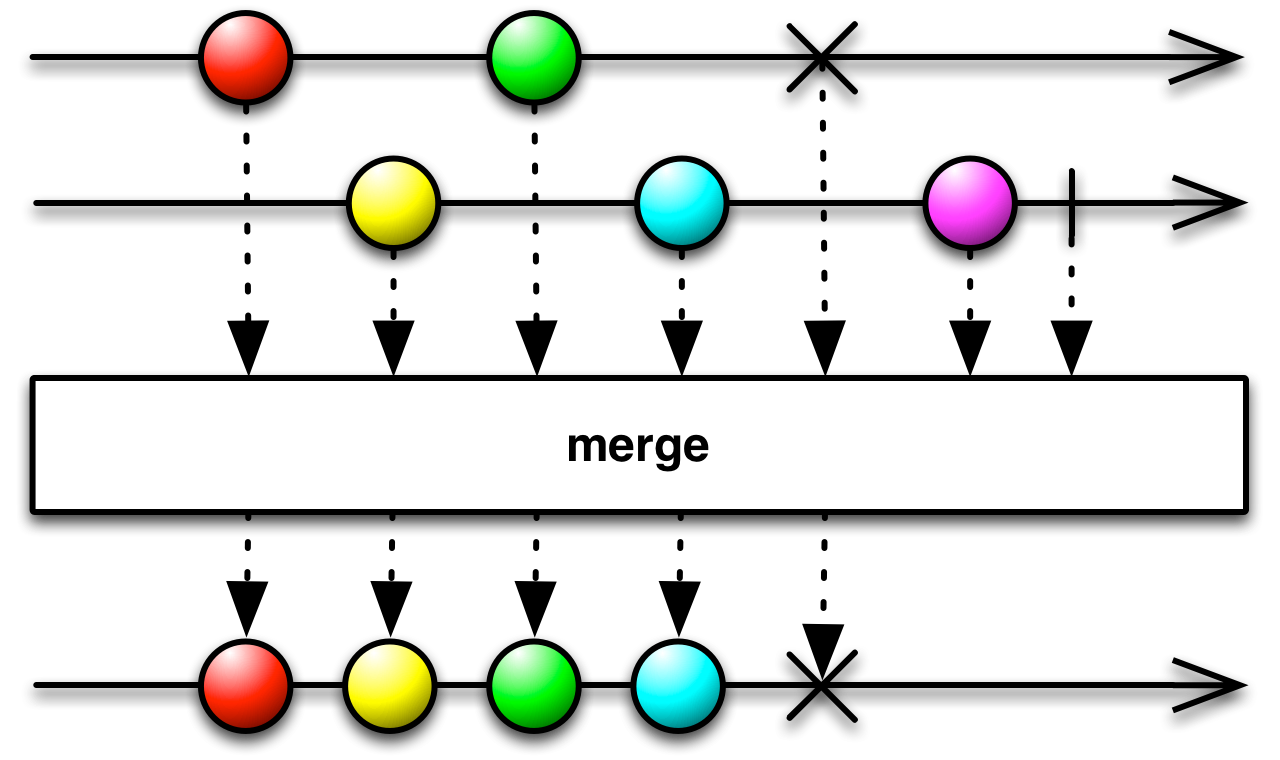
You can combine items emitted by multiple Maybes so that they appear as a single Flowable, by
using the mergeWith method.
- Backpressure:
- The operator honors backpressure from downstream.
- Scheduler:
mergeWithdoes not operate by default on a particularScheduler.
Parameters
| other | a MaybeSource to be merged |
|---|
Returns
- a new Flowable instance
public static Maybe<T> never ()
Returns a Maybe that never sends any items or notifications to a MaybeObserver.

This Maybe is useful primarily for testing purposes.
- Scheduler:
neverdoes not operate by default on a particularScheduler.
Returns
- a Maybe that never emits any items or sends any notifications to a
MaybeObserver
public final Maybe<T> observeOn (Scheduler scheduler)
Wraps a Maybe to emit its item (or notify of its error) on a specified Scheduler,
asynchronously.

- Scheduler:
- you specify which
Schedulerthis operator will use
Parameters
| scheduler | the Scheduler to notify subscribers on |
|---|
Returns
- the new Maybe instance that its subscribers are notified on the specified
Scheduler
public final Maybe<U> ofType (Class<U> clazz)
Filters the items emitted by a Maybe, only emitting its success value if that is an instance of the supplied Class.
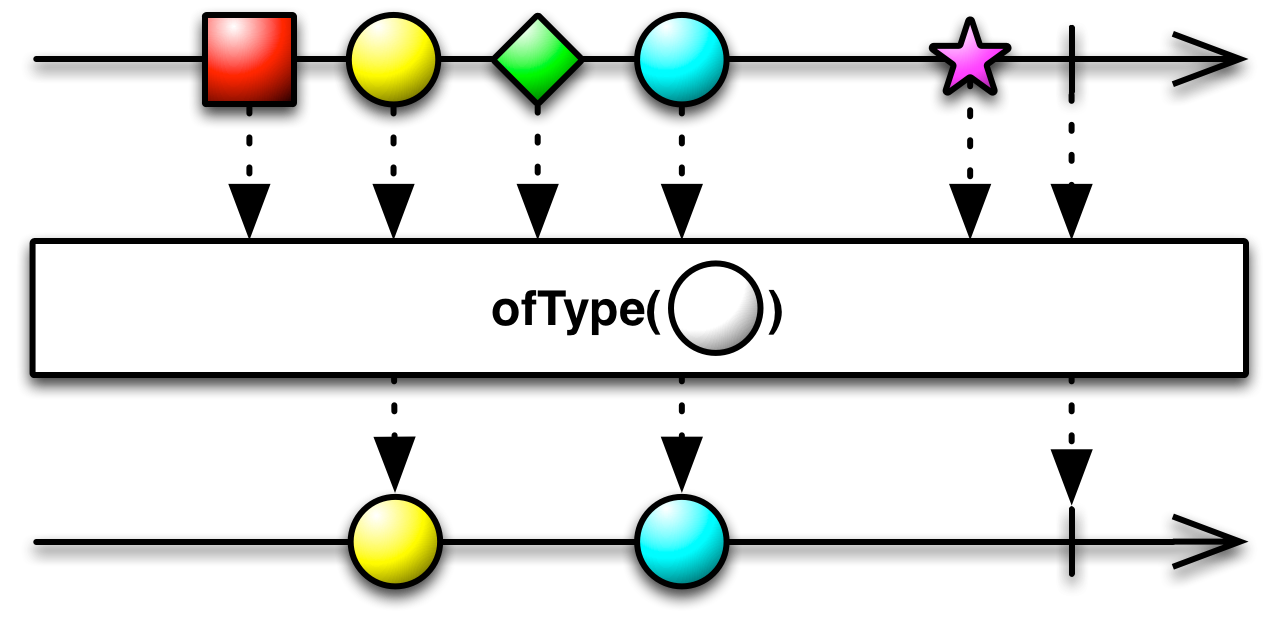
- Scheduler:
ofTypedoes not operate by default on a particularScheduler.
Parameters
| clazz | the class type to filter the items emitted by the source Maybe |
|---|
Returns
- the new Maybe instance
public final Maybe<T> onErrorComplete (Predicate<? super Throwable> predicate)
Returns a Maybe instance that if this Maybe emits an error and the predicate returns true, it will emit an onComplete and swallow the throwable.
- Scheduler:
onErrorCompletedoes not operate by default on a particularScheduler.
Parameters
| predicate | the predicate to call when an Throwable is emitted which should return true if the Throwable should be swallowed and replaced with an onComplete. |
|---|
Returns
- the new Completable instance
public final Maybe<T> onErrorComplete ()
Returns a Maybe instance that if this Maybe emits an error, it will emit an onComplete and swallow the throwable.
- Scheduler:
onErrorCompletedoes not operate by default on a particularScheduler.
Returns
- the new Completable instance
public final Maybe<T> onErrorResumeNext (Function<? super Throwable, ? extends MaybeSource<? extends T>> resumeFunction)
Instructs a Maybe to pass control to another Maybe rather than invoking
onError if it encounters an error.
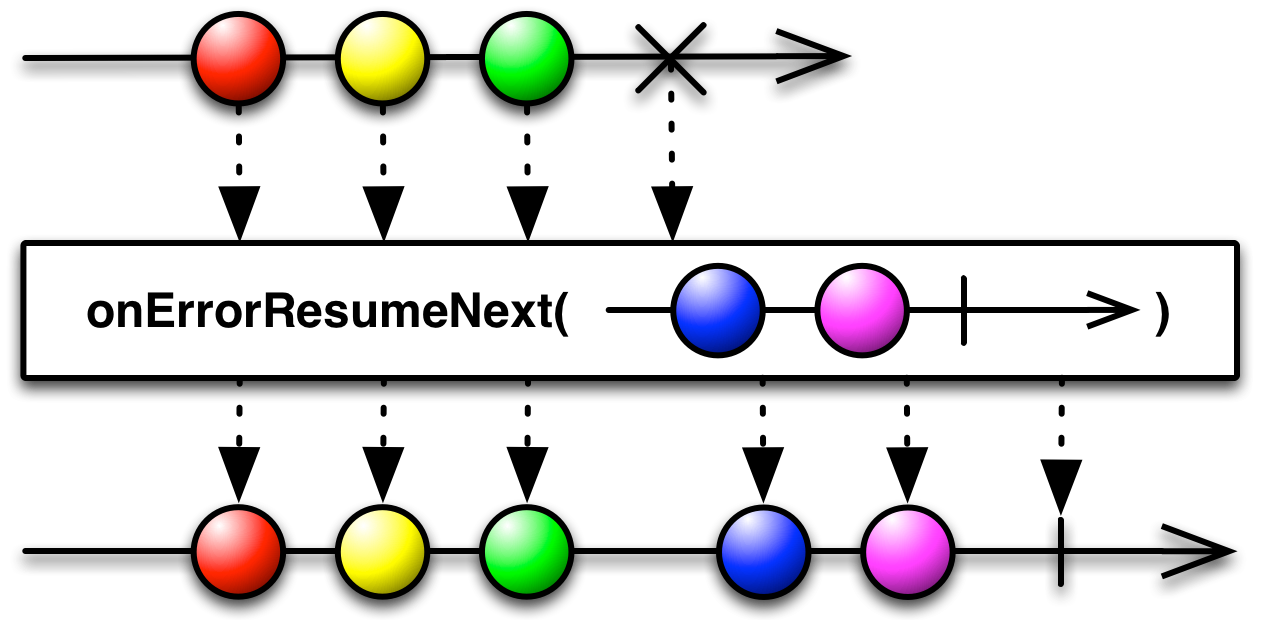
You can use this to prevent errors from propagating or to supply fallback data should errors be encountered.
- Scheduler:
onErrorResumeNextdoes not operate by default on a particularScheduler.
Parameters
| resumeFunction | a function that returns a MaybeSource that will take over if the source Maybe encounters an error |
|---|
Returns
- the new Maybe instance
public final Maybe<T> onErrorResumeNext (MaybeSource<? extends T> next)
Instructs a Maybe to pass control to another MaybeSource rather than invoking
onError if it encounters an error.

You can use this to prevent errors from propagating or to supply fallback data should errors be encountered.
- Scheduler:
onErrorResumeNextdoes not operate by default on a particularScheduler.
Parameters
| next | the next Maybe source that will take over if the source Maybe encounters an error |
|---|
Returns
- the new Maybe instance
public final Maybe<T> onErrorReturn (Function<? super Throwable, ? extends T> valueSupplier)
Instructs a Maybe to emit an item (returned by a specified function) rather than invoking
onError if it encounters an error.
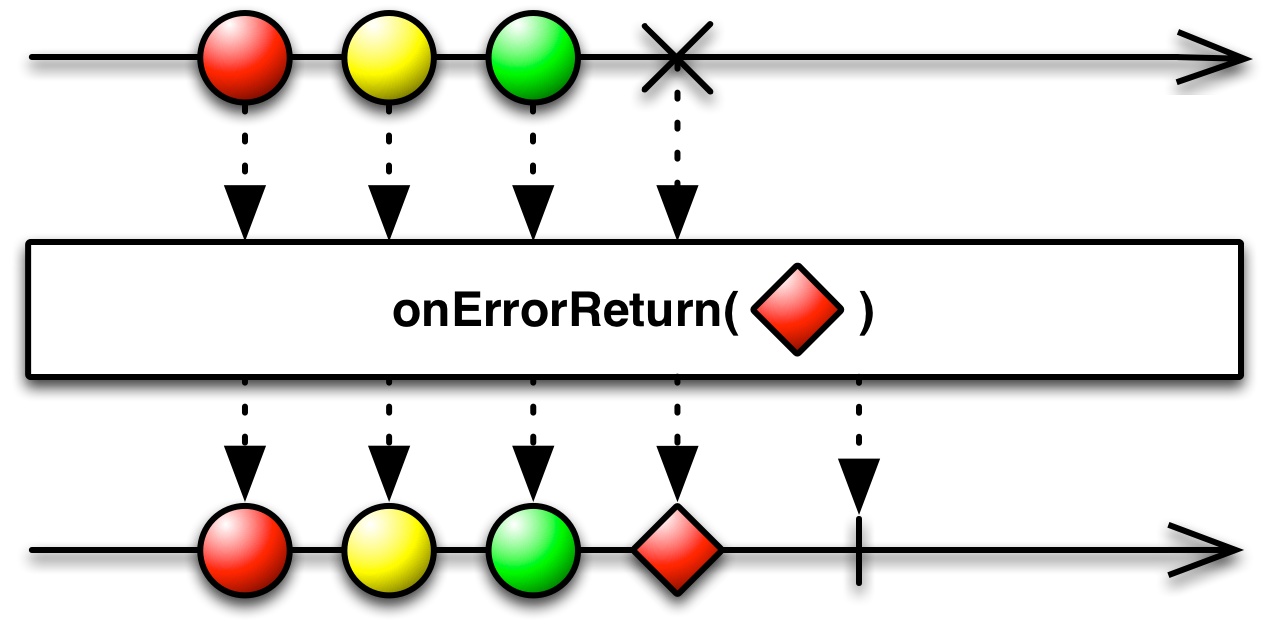
You can use this to prevent errors from propagating or to supply fallback data should errors be encountered.
- Scheduler:
onErrorReturndoes not operate by default on a particularScheduler.
Parameters
| valueSupplier | a function that returns a single value that will be emitted as success value the current Maybe signals an onError event |
|---|
Returns
- the new Maybe instance
public final Maybe<T> onErrorReturnItem (T item)
Instructs a Maybe to emit an item (returned by a specified function) rather than invoking
onError if it encounters an error.

You can use this to prevent errors from propagating or to supply fallback data should errors be encountered.
- Scheduler:
onErrorReturnItemdoes not operate by default on a particularScheduler.
Parameters
| item | the value that is emitted as onSuccess in case this Maybe signals an onError |
|---|
Returns
- the new Maybe instance
public final Maybe<T> onExceptionResumeNext (MaybeSource<? extends T> next)
Instructs a Maybe to pass control to another MaybeSource rather than invoking
onError if it encounters an Exception.
This differs from onErrorResumeNext(MaybeSource) in that this one does not handle Throwable
or java.lang.Error but lets those continue through.
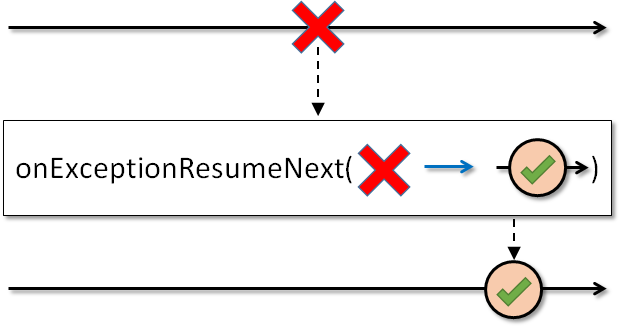
You can use this to prevent exceptions from propagating or to supply fallback data should exceptions be encountered.
- Scheduler:
onExceptionResumeNextdoes not operate by default on a particularScheduler.
Parameters
| next | the next MaybeSource that will take over if the source Maybe encounters an exception |
|---|
Returns
- the new Maybe instance
public final Maybe<T> onTerminateDetach ()
Nulls out references to the upstream producer and downstream MaybeObserver if the sequence is terminated or downstream calls dispose().
- Scheduler:
onTerminateDetachdoes not operate by default on a particularScheduler.
Returns
- a Maybe which out references to the upstream producer and downstream MaybeObserver if the sequence is terminated or downstream calls dispose()
public final Flowable<T> repeat ()
Returns a Flowable that repeats the sequence of items emitted by the source Maybe indefinitely.
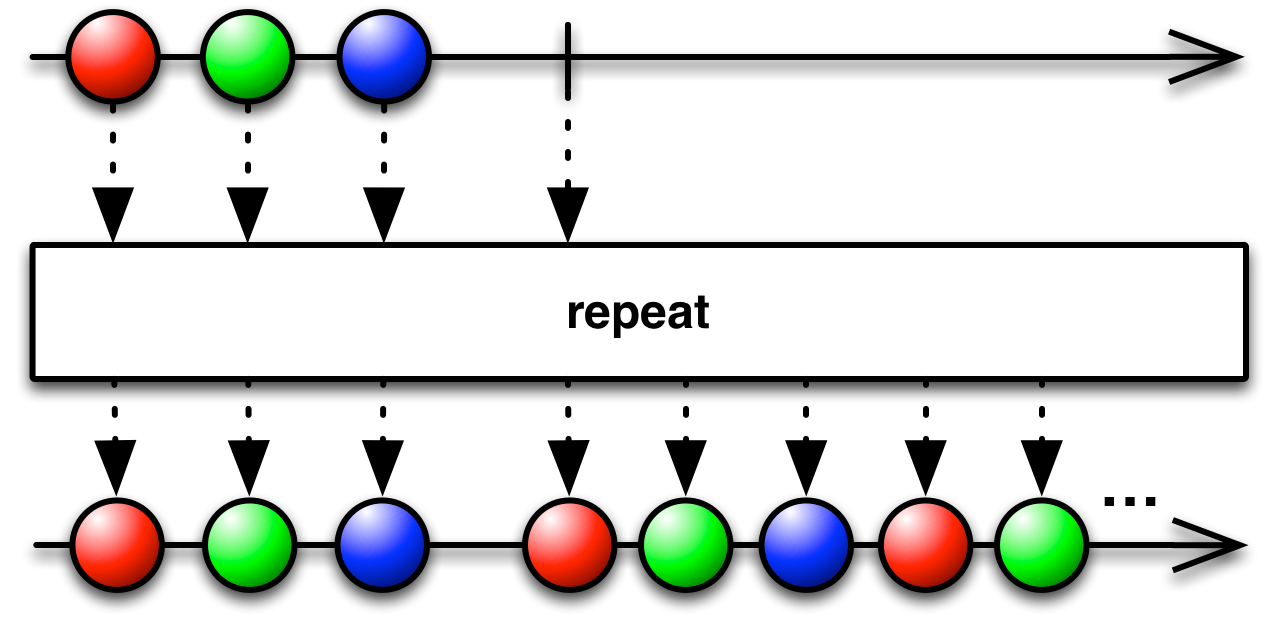
- Backpressure:
- The operator honors downstream backpressure.
- Scheduler:
repeatdoes not operate by default on a particularScheduler.
Returns
- a Flowable that emits the items emitted by the source Maybe repeatedly and in sequence
public final Flowable<T> repeat (long times)
Returns a Flowable that repeats the sequence of items emitted by the source Maybe at most
count times.

- Backpressure:
- This operator honors downstream backpressure.
- Scheduler:
repeatdoes not operate by default on a particularScheduler.
Parameters
| times | the number of times the source Maybe items are repeated, a count of 0 will yield an empty sequence |
|---|
Returns
- a Flowable that repeats the sequence of items emitted by the source Maybe at most
counttimes
Throws
| IllegalArgumentException | if count is less than zero |
|---|
public final Flowable<T> repeatUntil (BooleanSupplier stop)
Returns a Flowable that repeats the sequence of items emitted by the source Maybe until the provided stop function returns true.

- Backpressure:
- This operator honors downstream backpressure.
- Scheduler:
repeatUntildoes not operate by default on a particularScheduler.
Parameters
| stop | a boolean supplier that is called when the current Flowable completes and unless it returns false, the current Flowable is resubscribed |
|---|
Returns
- the new Flowable instance
Throws
| NullPointerException | if stop is null |
|---|
public final Flowable<T> repeatWhen (Function<? super Flowable<Object>, ? extends Publisher<?>> handler)
Returns a Flowable that emits the same values as the source Publisher with the exception of an
onComplete. An onComplete notification from the source will result in the emission of
a void item to the Publisher provided as an argument to the notificationHandler
function. If that Publisher calls onComplete or onError then repeatWhen will
call onComplete or onError on the child subscription. Otherwise, this Publisher will
resubscribe to the source Publisher.
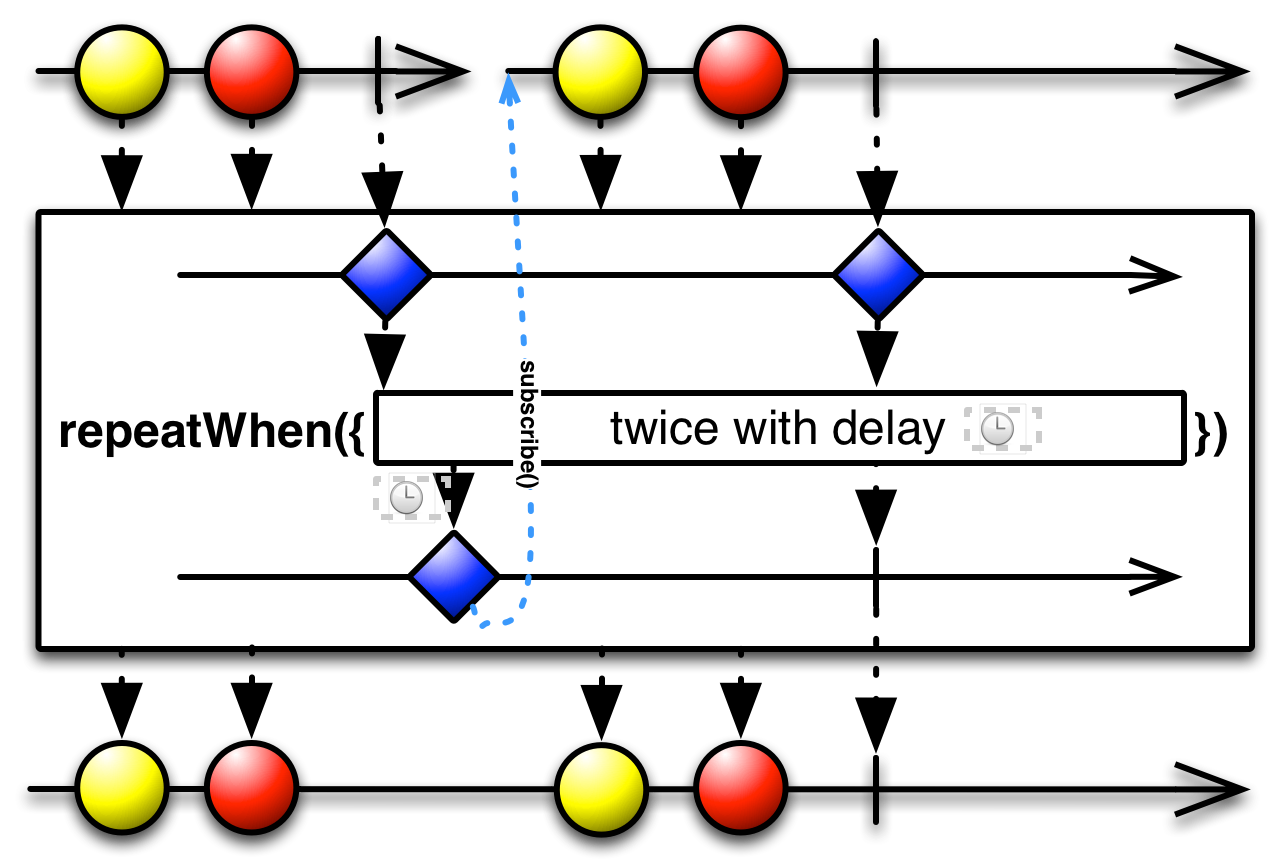
- Backpressure:
- The operator honors downstream backpressure and expects the source
Publisherto honor backpressure as well. If this expectation is violated, the operator may throw anIllegalStateException. - Scheduler:
repeatWhendoes not operate by default on a particularScheduler.
Parameters
| handler | receives a Publisher of notifications with which a user can complete or error, aborting the repeat. |
|---|
Returns
- the source Publisher modified with repeat logic
public final Maybe<T> retry (long times, Predicate<? super Throwable> predicate)
Retries at most times or until the predicate returns false, whichever happens first.
- Scheduler:
retrydoes not operate by default on a particularScheduler.
Parameters
| times | the number of times to repeat |
|---|---|
| predicate | the predicate called with the failure Throwable and should return true to trigger a retry. |
Returns
- the new Maybe instance
public final Maybe<T> retry (BiPredicate<? super Integer, ? super Throwable> predicate)
Returns a Maybe that mirrors the source Maybe, resubscribing to it if it calls onError
and the predicate returns true for that specific exception and retry count.
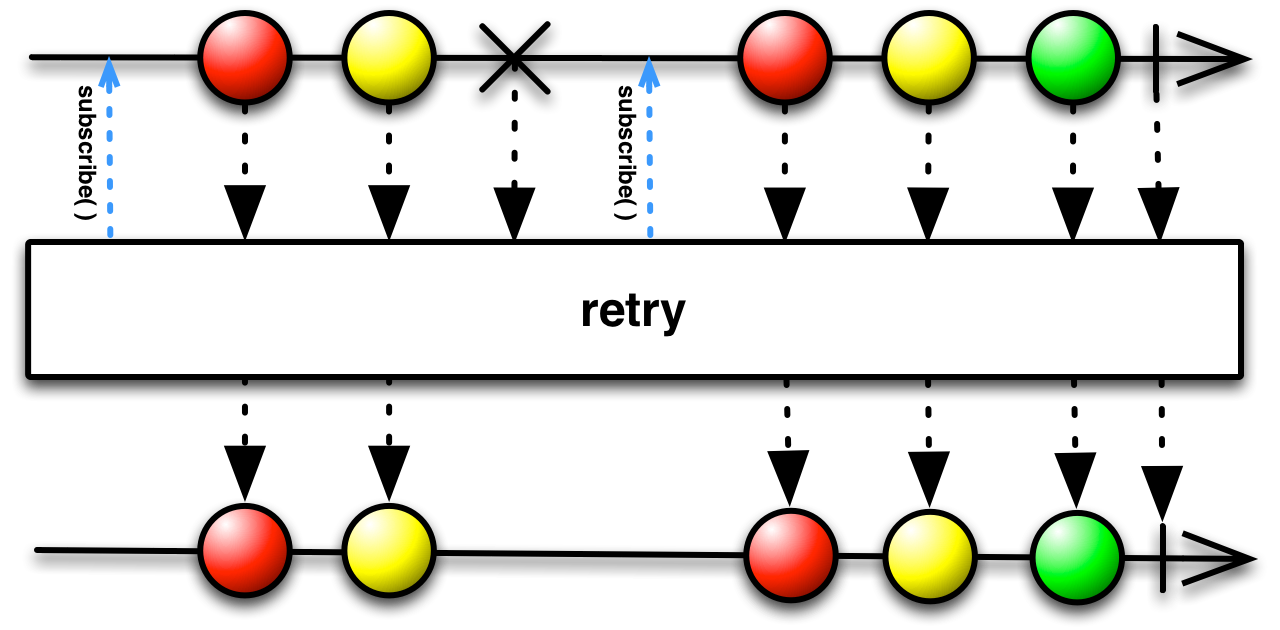
- Scheduler:
retrydoes not operate by default on a particularScheduler.
Parameters
| predicate | the predicate that determines if a resubscription may happen in case of a specific exception and retry count |
|---|
Returns
- the nww Maybe instance
public final Maybe<T> retry (Predicate<? super Throwable> predicate)
Retries the current Maybe if it fails and the predicate returns true.
- Scheduler:
retrydoes not operate by default on a particularScheduler.
Parameters
| predicate | the predicate that receives the failure Throwable and should return true to trigger a retry. |
|---|
Returns
- the new Maybe instance
public final Maybe<T> retry ()
Returns a Maybe that mirrors the source Maybe, resubscribing to it if it calls onError
(infinite retry count).

If the source Maybe calls onError(Throwable), this method will resubscribe to the source
Maybe rather than propagating the onError call.
- Scheduler:
retrydoes not operate by default on a particularScheduler.
Returns
- the nww Maybe instance
public final Maybe<T> retry (long count)
Returns a Maybe that mirrors the source Maybe, resubscribing to it if it calls onError
up to a specified number of retries.

If the source Maybe calls onError(Throwable), this method will resubscribe to the source
Maybe for a maximum of count resubscriptions rather than propagating the
onError call.
- Scheduler:
retrydoes not operate by default on a particularScheduler.
Parameters
| count | number of retry attempts before failing |
|---|
Returns
- the new Maybe instance
public final Maybe<T> retryUntil (BooleanSupplier stop)
Retries until the given stop function returns true.
- Scheduler:
retryUntildoes not operate by default on a particularScheduler.
Parameters
| stop | the function that should return true to stop retrying |
|---|
Returns
- the new Maybe instance
public final Maybe<T> retryWhen (Function<? super Flowable<Throwable>, ? extends Publisher<?>> handler)
Returns a Maybe that emits the same values as the source Maybe with the exception of an
onError. An onError notification from the source will result in the emission of a
Throwable item to the Publisher provided as an argument to the notificationHandler
function. If that Publisher calls onComplete or onError then retry will call
onComplete or onError on the child subscription. Otherwise, this Publisher will
resubscribe to the source Publisher.
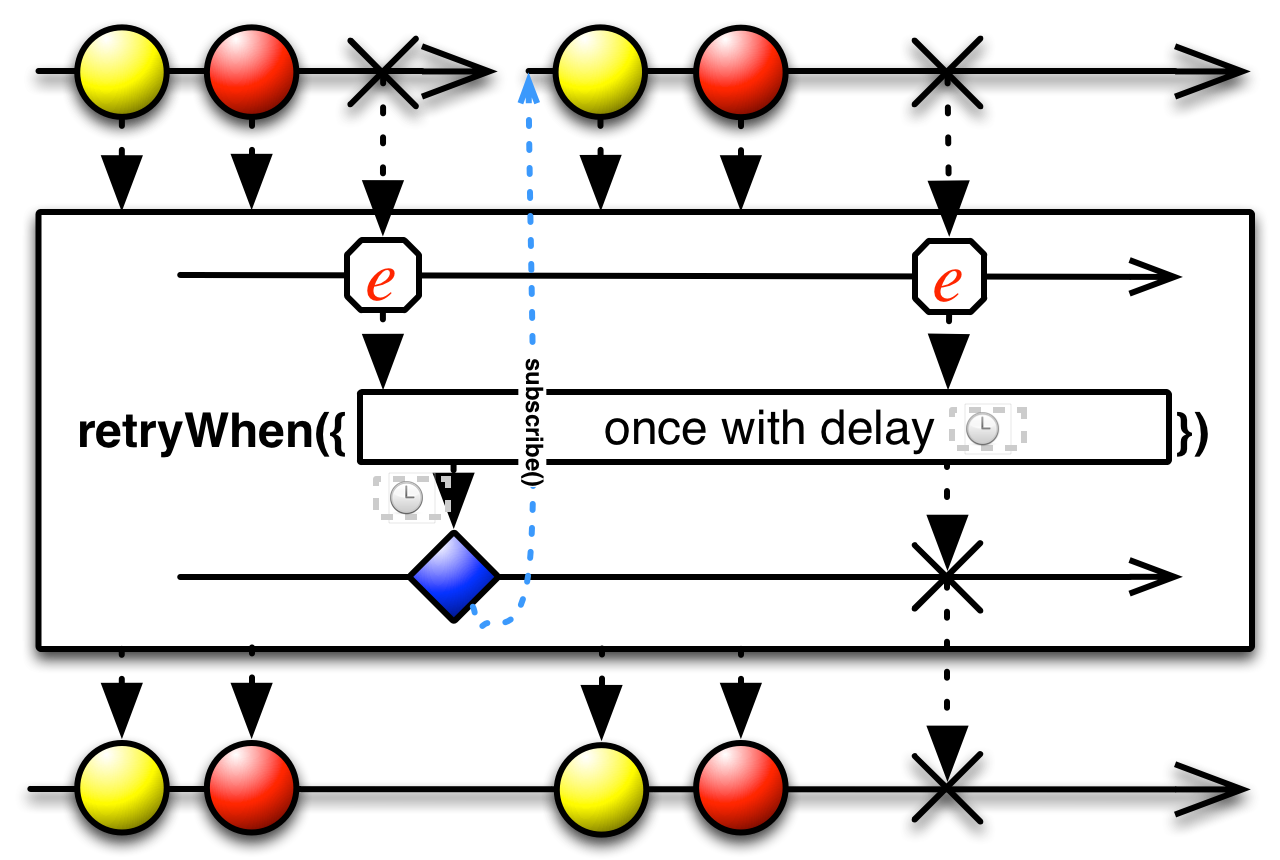 Example:
This retries 3 times, each time incrementing the number of seconds it waits.
Example:
This retries 3 times, each time incrementing the number of seconds it waits.
Flowable.create((FlowableEmitter<? super String> s) -> {
System.out.println("subscribing");
s.onError(new RuntimeException("always fails"));
}, BackpressureStrategy.BUFFER).retryWhen(attempts -> {
return attempts.zipWith(Publisher.range(1, 3), (n, i) -> i).flatMap(i -> {
System.out.println("delay retry by " + i + " second(s)");
return Publisher.timer(i, TimeUnit.SECONDS);
});
}).blockingForEach(System.out::println);
subscribing
delay retry by 1 second(s)
subscribing
delay retry by 2 second(s)
subscribing
delay retry by 3 second(s)
subscribing
- Scheduler:
retryWhendoes not operate by default on a particularScheduler.
Parameters
| handler | receives a Publisher of notifications with which a user can complete or error, aborting the retry |
|---|
Returns
- the new Maybe instance
public static Single<Boolean> sequenceEqual (MaybeSource<? extends T> source1, MaybeSource<? extends T> source2)
Returns a Single that emits a Boolean value that indicates whether two MaybeSource sequences are the same by comparing the items emitted by each MaybeSource pairwise.
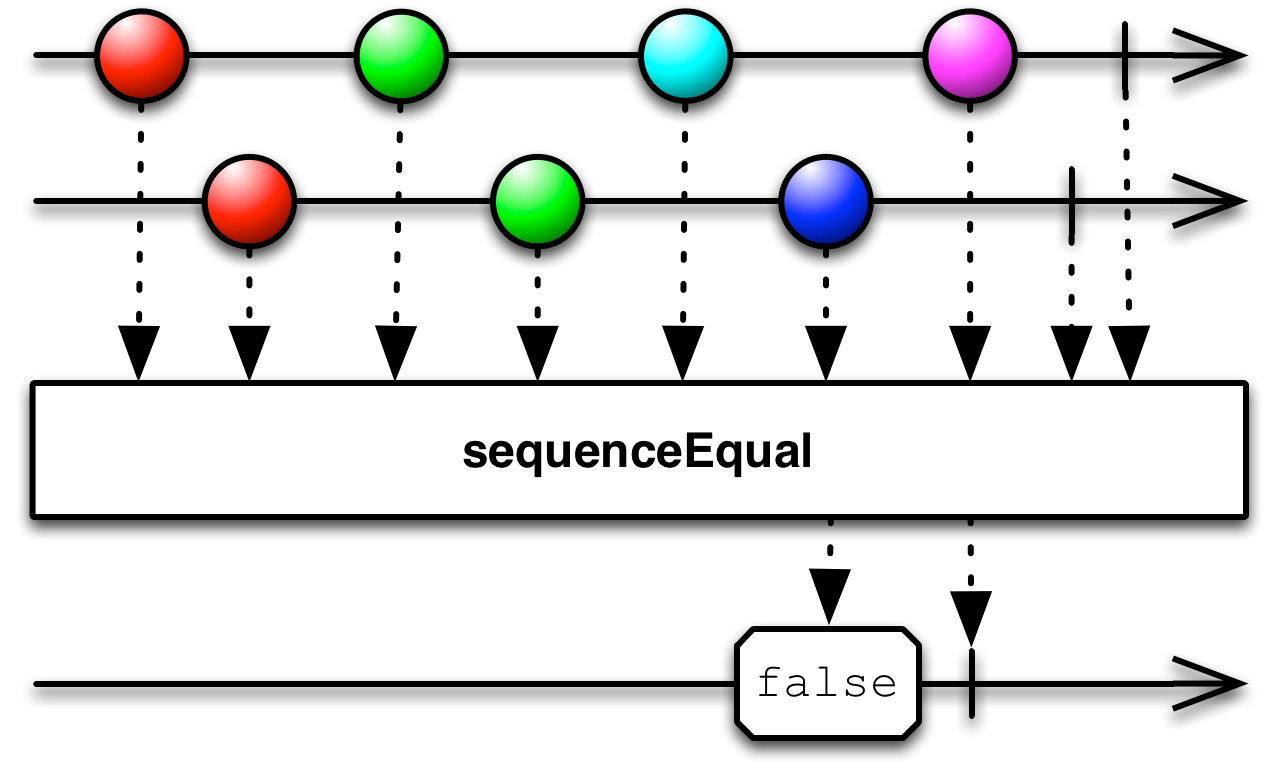
- Scheduler:
sequenceEqualdoes not operate by default on a particularScheduler.
Parameters
| source1 | the first MaybeSource to compare |
|---|---|
| source2 | the second MaybeSource to compare |
Returns
- a Single that emits a Boolean value that indicates whether the two sequences are the same
public static Single<Boolean> sequenceEqual (MaybeSource<? extends T> source1, MaybeSource<? extends T> source2, BiPredicate<? super T, ? super T> isEqual)
Returns a Single that emits a Boolean value that indicates whether two MaybeSources are the same by comparing the items emitted by each MaybeSource pairwise based on the results of a specified equality function.

- Scheduler:
sequenceEqualdoes not operate by default on a particularScheduler.
Parameters
| source1 | the first MaybeSource to compare |
|---|---|
| source2 | the second MaybeSource to compare |
| isEqual | a function used to compare items emitted by each MaybeSource |
Returns
- a Single that emits a Boolean value that indicates whether the two MaybeSource sequences are the same according to the specified function
public final void subscribe (MaybeObserver<? super T> observer)
Subscribes the given MaybeObserver to this MaybeSource instance.
Parameters
| observer | the MaybeObserver, not null |
|---|
public final Disposable subscribe (Consumer<? super T> onSuccess)
Subscribes to a Maybe and provides a callback to handle the items it emits.
If the Maybe emits an error, it is wrapped into an
OnErrorNotImplementedException
and routed to the RxJavaPlugins.onError handler.
- Scheduler:
subscribedoes not operate by default on a particularScheduler.
Parameters
| onSuccess | the Consumer<T> you have designed to accept a success value from the Maybe |
|---|
Returns
- a
Disposablereference with which the caller can stop receiving items before the Maybe has finished sending them
Throws
| NullPointerException | if onSuccess is null |
|---|
public final Disposable subscribe (Consumer<? super T> onSuccess, Consumer<? super Throwable> onError, Action onComplete)
Subscribes to a Maybe and provides callbacks to handle the items it emits and any error or completion notification it issues.
- Scheduler:
subscribedoes not operate by default on a particularScheduler.
Parameters
| onSuccess | the Consumer<T> you have designed to accept a success value from the Maybe |
|---|---|
| onError | the Consumer<Throwable> you have designed to accept any error notification from the
Maybe |
| onComplete | the Action you have designed to accept a completion notification from the
Maybe |
Returns
- a
Disposablereference with which the caller can stop receiving items before the Maybe has finished sending them
Throws
| NullPointerException | if onSuccess is null, or
if onError is null, or
if onComplete is null |
|---|
public final Disposable subscribe (Consumer<? super T> onSuccess, Consumer<? super Throwable> onError)
Subscribes to a Maybe and provides callbacks to handle the items it emits and any error notification it issues.
- Scheduler:
subscribedoes not operate by default on a particularScheduler.
Parameters
| onSuccess | the Consumer<T> you have designed to accept a success value from the Maybe |
|---|---|
| onError | the Consumer<Throwable> you have designed to accept any error notification from the
Maybe |
Returns
- a
Disposablereference with which the caller can stop receiving items before the Maybe has finished sending them
Throws
| NullPointerException | if onSuccess is null, or
if onError is null
|
|---|
public final Disposable subscribe ()
Subscribes to a Maybe and ignores onSuccess and onComplete emissions.
If the Maybe emits an error, it is wrapped into an
OnErrorNotImplementedException
and routed to the RxJavaPlugins.onError handler.
- Scheduler:
subscribedoes not operate by default on a particularScheduler.
Returns
- a
Disposablereference with which the caller can stop receiving items before the Maybe has finished sending them
public final Maybe<T> subscribeOn (Scheduler scheduler)
public final E subscribeWith (E observer)
Subscribes a given MaybeObserver (subclass) to this Maybe and returns the given MaybeObserver as is.
Usage example:
Maybe<Integer> source = Maybe.just(1);
CompositeDisposable composite = new CompositeDisposable();
MaybeObserver<Integer> ms = new MaybeObserver<>() {
// ...
};
composite.add(source.subscribeWith(ms));
- Scheduler:
subscribeWithdoes not operate by default on a particularScheduler.
Parameters
| observer | the MaybeObserver (subclass) to use and return, not null |
|---|
Returns
- the input
subscriber
Throws
| NullPointerException | if subscriber is null
|
|---|
public final Maybe<T> switchIfEmpty (MaybeSource<? extends T> other)
Returns a Maybe that emits the items emitted by the source Maybe or the items of an alternate MaybeSource if the current Maybe is empty.
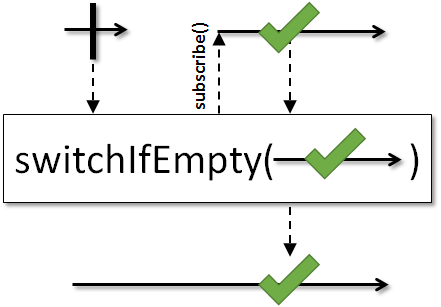
- Scheduler:
switchIfEmptydoes not operate by default on a particularScheduler.
Parameters
| other | the alternate MaybeSource to subscribe to if the main does not emit any items |
|---|
Returns
- a Maybe that emits the items emitted by the source Maybe or the items of an alternate MaybeSource if the source Maybe is empty.
public final Maybe<T> takeUntil (Publisher<U> other)
Returns a Maybe that emits the item emitted by the source Maybe until a second Publisher emits an item.
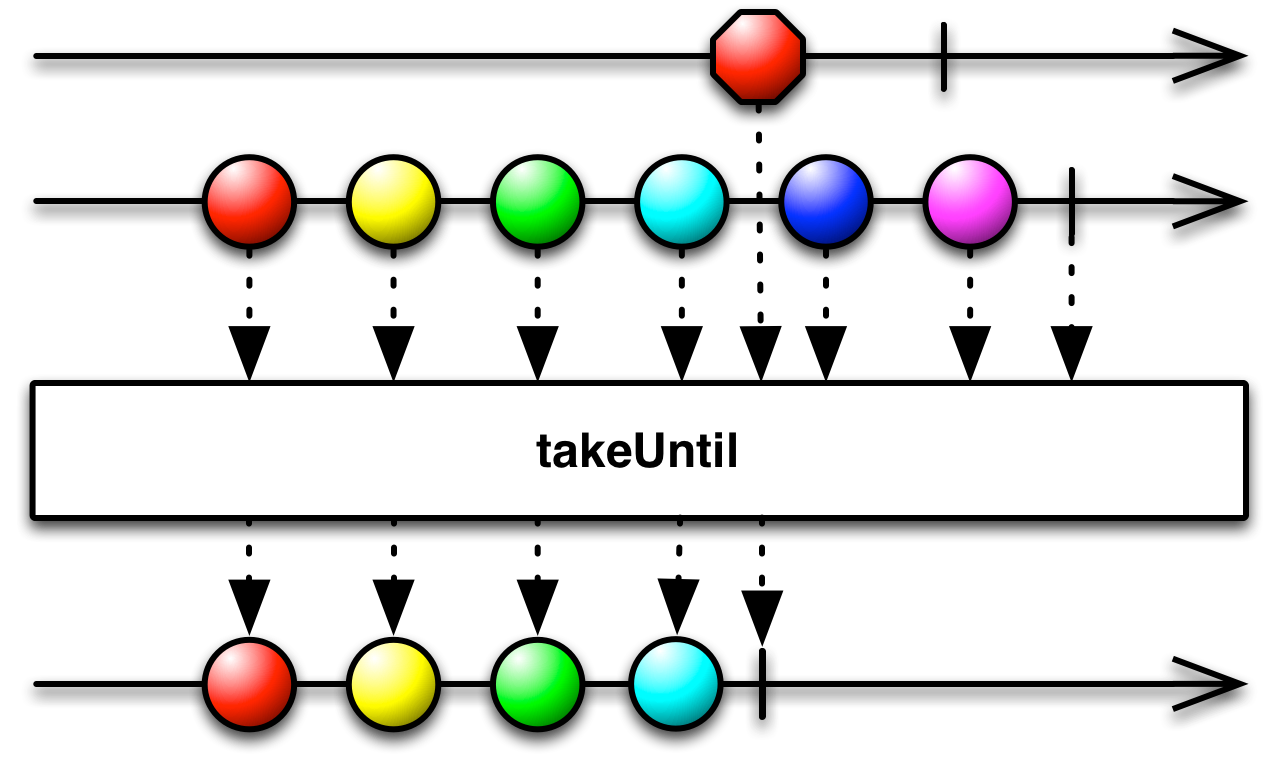
- Backpressure:
- The
Publisheris consumed in an unbounded fashion and is cancelled after the first item emitted. - Scheduler:
takeUntildoes not operate by default on a particularScheduler.
Parameters
| other | the Publisher whose first emitted item will cause takeUntil to stop emitting items
from the source Publisher |
|---|
Returns
- a Maybe that emits the items emitted by the source Maybe until such time as
otheremits its first item
public final Maybe<T> takeUntil (MaybeSource<U> other)
Returns a Maybe that emits the items emitted by the source Maybe until a second MaybeSource emits an item.

- Scheduler:
takeUntildoes not operate by default on a particularScheduler.
Parameters
| other | the MaybeSource whose first emitted item will cause takeUntil to stop emitting items
from the source Maybe |
|---|
Returns
- a Maybe that emits the items emitted by the source Maybe until such time as
otheremits its first item
public final TestObserver<T> test (boolean cancelled)
Creates a TestObserver optionally in cancelled state, then subscribes it to this Maybe.
- Scheduler:
testdoes not operate by default on a particularScheduler.
Parameters
| cancelled | if true, the TestObserver will be cancelled before subscribing to this Maybe. |
|---|
Returns
- the new TestObserver instance
public final TestObserver<T> test ()
Creates a TestObserver and subscribes it to this Maybe.
- Scheduler:
testdoes not operate by default on a particularScheduler.
Returns
- the new TestObserver instance
public final Maybe<T> timeout (long timeout, TimeUnit timeUnit)
Returns a Maybe that mirrors the source Maybe but applies a timeout policy for each emitted
item. If the next item isn't emitted within the specified timeout duration starting from its predecessor,
the resulting Maybe terminates and notifies MaybeObservers of a TimeoutException.
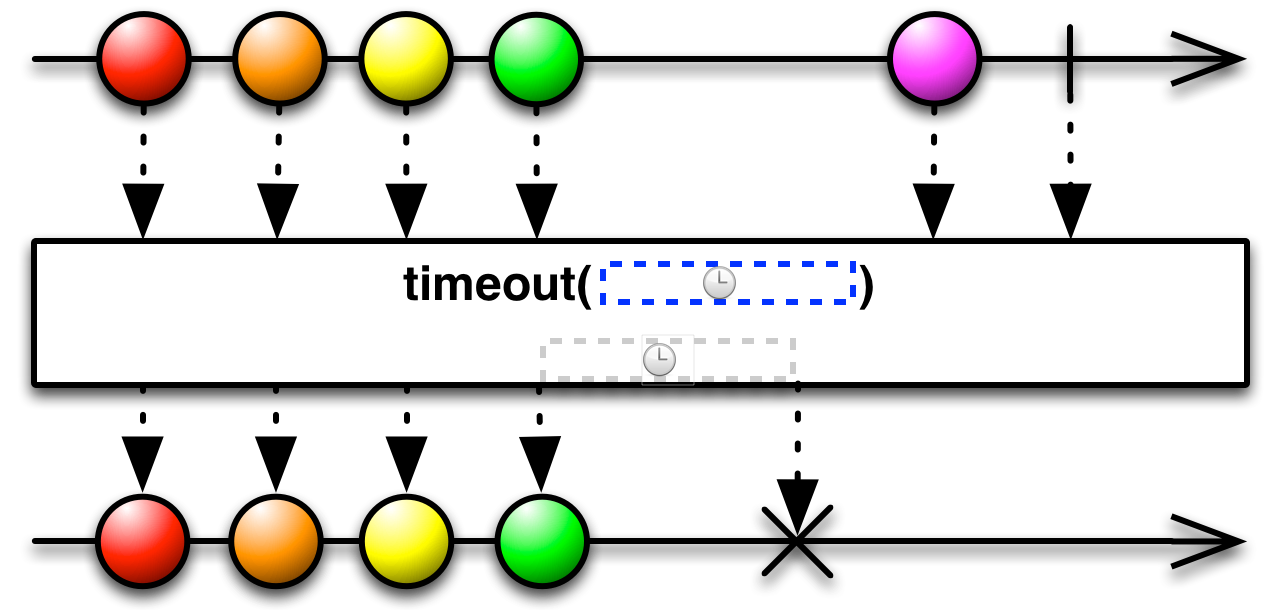
- Scheduler:
- This version of
timeoutoperates by default on thecomputationScheduler.
Parameters
| timeout | maximum duration between emitted items before a timeout occurs |
|---|---|
| timeUnit | the unit of time that applies to the timeout argument. |
Returns
- the new Maybe instance
public final Maybe<T> timeout (Publisher<U> timeoutIndicator, MaybeSource<? extends T> fallback)
If the current Maybe source didn't signal an event before the timeoutIndicator Publisher signals,
the current Maybe is cancelled and the fallback MaybeSource subscribed to
as a continuation.
- Backpressure:
- The
timeoutIndicatorPublisher is consumed in an unbounded manner and is cancelled after its first item. - Scheduler:
timeoutdoes not operate by default on a particularScheduler.
Parameters
| timeoutIndicator | the MaybeSource that indicates the timeout by signalling onSuccess or onComplete |
|---|---|
| fallback | the MaybeSource that is subscribed to if the current Maybe times out |
Returns
- the new Maybe instance
public final Maybe<T> timeout (MaybeSource<U> timeoutIndicator, MaybeSource<? extends T> fallback)
If the current Maybe source didn't signal an event before the timeoutIndicator MaybeSource signals,
the current Maybe is cancelled and the fallback MaybeSource subscribed to
as a continuation.
- Scheduler:
timeoutdoes not operate by default on a particularScheduler.
Parameters
| timeoutIndicator | the MaybeSource that indicates the timeout by signalling onSuccess or onComplete. |
|---|---|
| fallback | the MaybeSource that is subscribed to if the current Maybe times out |
Returns
- the new Maybe instance
public final Maybe<T> timeout (long timeout, TimeUnit timeUnit, MaybeSource<? extends T> fallback)
Returns a Maybe that mirrors the source Maybe but applies a timeout policy for each emitted item. If the next item isn't emitted within the specified timeout duration starting from its predecessor, the resulting Maybe begins instead to mirror a fallback MaybeSource.
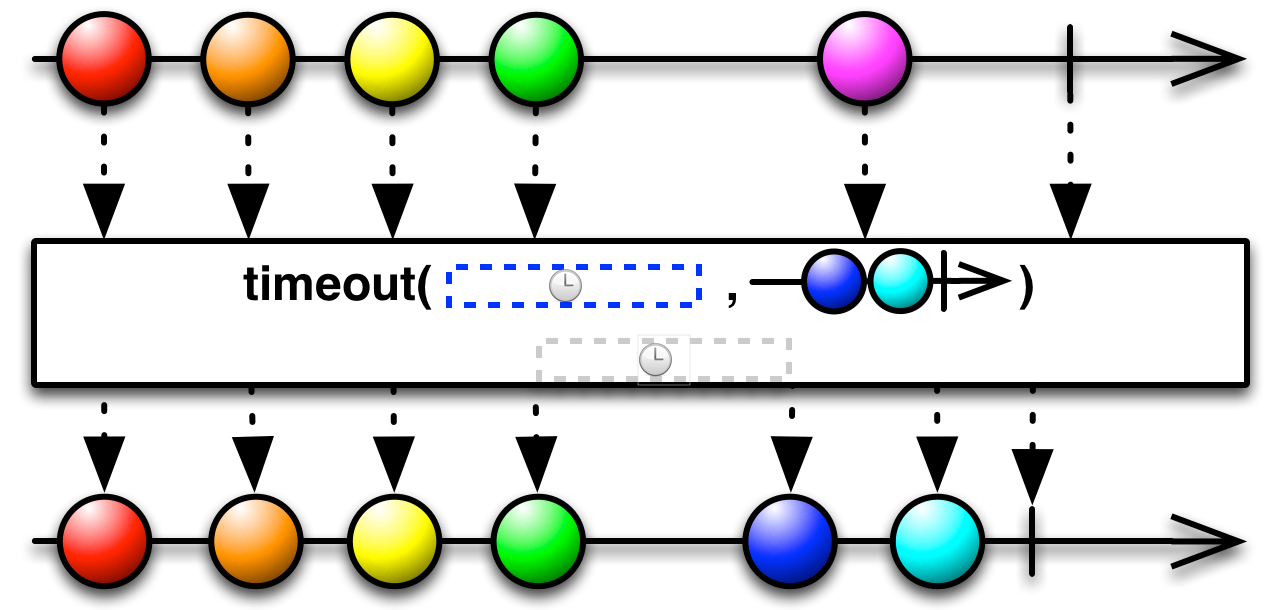
- Scheduler:
- This version of
timeoutoperates by default on thecomputationScheduler.
Parameters
| timeout | maximum duration between items before a timeout occurs |
|---|---|
| timeUnit | the unit of time that applies to the timeout argument |
| fallback | the fallback MaybeSource to use in case of a timeout |
Returns
- the new Maybe instance
public final Maybe<T> timeout (MaybeSource<U> timeoutIndicator)
If this Maybe source didn't signal an event before the timeoutIndicator MaybeSource signals, a TimeoutException is signalled instead.
- Scheduler:
timeoutdoes not operate by default on a particularScheduler.
Parameters
| timeoutIndicator | the MaybeSource that indicates the timeout by signalling onSuccess or onComplete. |
|---|
Returns
- the new Maybe instance
public final Maybe<T> timeout (long timeout, TimeUnit timeUnit, Scheduler scheduler, MaybeSource<? extends T> fallback)
Returns a Maybe that mirrors the source Maybe but applies a timeout policy for each emitted item using a specified Scheduler. If the next item isn't emitted within the specified timeout duration starting from its predecessor, the resulting Maybe begins instead to mirror a fallback MaybeSource.
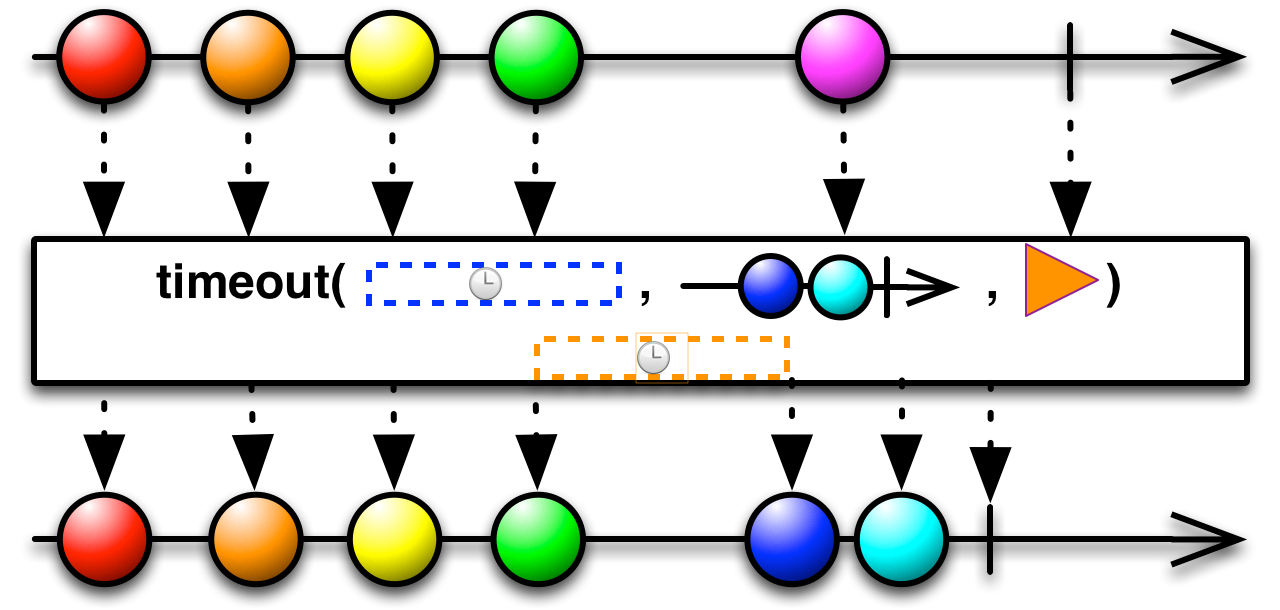
- Scheduler:
- You specify which
Schedulerthis operator will use
Parameters
| timeout | maximum duration between items before a timeout occurs |
|---|---|
| timeUnit | the unit of time that applies to the timeout argument |
| scheduler | the Scheduler to run the timeout timers on |
| fallback | the MaybeSource to use as the fallback in case of a timeout |
Returns
- the new Maybe instance
public final Maybe<T> timeout (Publisher<U> timeoutIndicator)
If this Maybe source didn't signal an event before the timeoutIndicator Publisher signals, a TimeoutException is signalled instead.
- Backpressure:
- The
timeoutIndicatorPublisher is consumed in an unbounded manner and is cancelled after its first item. - Scheduler:
timeoutdoes not operate by default on a particularScheduler.
Parameters
| timeoutIndicator | the MaybeSource that indicates the timeout by signalling onSuccess or onComplete. |
|---|
Returns
- the new Maybe instance
public final Maybe<T> timeout (long timeout, TimeUnit timeUnit, Scheduler scheduler)
Returns a Maybe that mirrors the source Maybe but applies a timeout policy for each emitted
item, where this policy is governed on a specified Scheduler. If the next item isn't emitted within the
specified timeout duration starting from its predecessor, the resulting Maybe terminates and
notifies MaybeObservers of a TimeoutException.
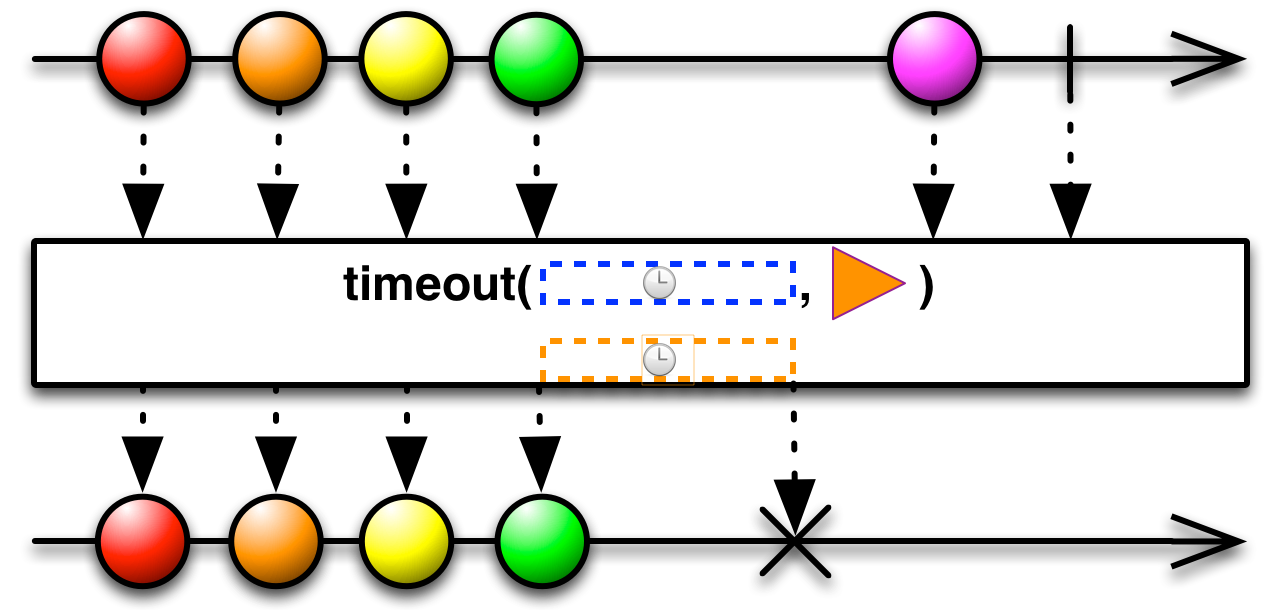
- Scheduler:
- You specify which
Schedulerthis operator will use
Parameters
| timeout | maximum duration between items before a timeout occurs |
|---|---|
| timeUnit | the unit of time that applies to the timeout argument |
| scheduler | the Scheduler to run the timeout timers on |
Returns
- the new Maybe instance
public static Maybe<Long> timer (long delay, TimeUnit unit, Scheduler scheduler)
Returns a Maybe that emits 0L after a specified delay on a specified Scheduler.

- Scheduler:
- You specify which
Schedulerthis operator will use
Parameters
| delay | the initial delay before emitting a single 0L |
|---|---|
| unit | time units to use for delay |
| scheduler | the Scheduler to use for scheduling the item |
Returns
- a Maybe that emits
0Lafter a specified delay, on a specified Scheduler
public static Maybe<Long> timer (long delay, TimeUnit unit)
Returns a Maybe that emits 0L after a specified delay.

- Scheduler:
timeroperates by default on thecomputationScheduler.
Parameters
| delay | the initial delay before emitting a single 0L |
|---|---|
| unit | time units to use for delay |
Returns
- a Maybe that emits
0Lafter a specified delay
public final R to (Function<? super Maybe<T>, R> convert)
Calls the specified converter function with the current Maybe instance during assembly time and returns its result.
- Scheduler:
todoes not operate by default on a particularScheduler.
Parameters
| convert | the function that is called with the current Maybe instance during assembly time that should return some value to be the result |
|---|
Returns
- the value returned by the convert function
public final Flowable<T> toFlowable ()
Converts this Maybe into a backpressure-aware Flowable instance composing cancellation through.
- Backpressure:
- The returned Flowable honors the backpressure of the downstream.
- Scheduler:
toFlowabledoes not operate by default on a particularScheduler.
Returns
- the new Flowable instance
public final Observable<T> toObservable ()
Converts this Maybe into an Observable instance composing cancellation through.
- Scheduler:
toObservabledoes not operate by default on a particularScheduler.
Returns
- the new Observable instance
public final Single<T> toSingle ()
Converts this Maybe into a Single instance composing cancellation through and turning an empty Maybe into a signal of NoSuchElementException.
- Scheduler:
toSingledoes not operate by default on a particularScheduler.
Returns
- the new Single instance
public final Single<T> toSingle (T defaultValue)
Converts this Maybe into a Single instance composing cancellation through and turning an empty Maybe into a Single that emits the given value through onSuccess.
- Scheduler:
toSingledoes not operate by default on a particularScheduler.
Parameters
| defaultValue | the default item to signal in Single if this Maybe is empty |
|---|
Returns
- the new Single instance
public static Maybe<T> unsafeCreate (MaybeSource<T> onSubscribe)
Advanced use only: creates a Maybe instance without any safeguards by using a callback that is called with a MaybeObserver.
- Scheduler:
unsafeCreatedoes not operate by default on a particularScheduler.
Parameters
| onSubscribe | the function that is called with the subscribing MaybeObserver |
|---|
Returns
- the new Maybe instance
public final Maybe<T> unsubscribeOn (Scheduler scheduler)
Returns a Maybe which makes sure when a MaybeObserver disposes the Disposable, that call is propagated up on the specified scheduler
- Scheduler:
unsubscribeOncalls dispose() of the upstream on theScheduleryou specify.
Parameters
| scheduler | the target scheduler where to execute the cancellation |
|---|
Returns
- the new Maybe instance
Throws
| NullPointerException | if scheduler is null |
|---|
public static Maybe<T> using (Callable<? extends D> resourceSupplier, Function<? super D, ? extends MaybeSource<? extends T>> sourceSupplier, Consumer<? super D> resourceDisposer)
Constructs a Maybe that creates a dependent resource object which is disposed of when the upstream terminates or the downstream calls dispose().
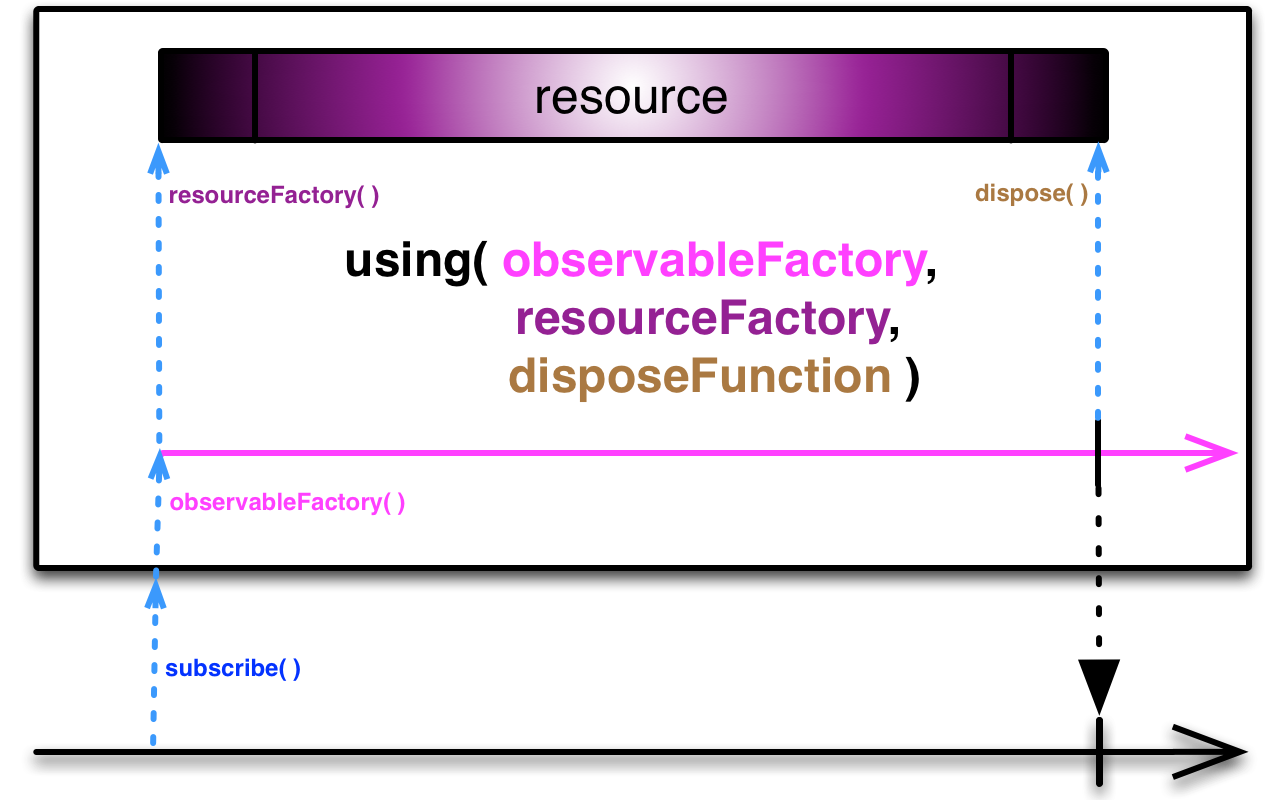
- Scheduler:
usingdoes not operate by default on a particularScheduler.
Parameters
| resourceSupplier | the factory function to create a resource object that depends on the Maybe |
|---|---|
| sourceSupplier | the factory function to create a MaybeSource |
| resourceDisposer | the function that will dispose of the resource |
Returns
- the Maybe whose lifetime controls the lifetime of the dependent resource object
public static Maybe<T> using (Callable<? extends D> resourceSupplier, Function<? super D, ? extends MaybeSource<? extends T>> sourceSupplier, Consumer<? super D> resourceDisposer, boolean eager)
Constructs a Maybe that creates a dependent resource object which is disposed of just before
termination if you have set disposeEagerly to true and a downstream dispose() does not occur
before termination. Otherwise resource disposal will occur on call to dispose(). Eager disposal is
particularly appropriate for a synchronous Maybe that reuses resources. disposeAction will
only be called once per subscription.

- Scheduler:
usingdoes not operate by default on a particularScheduler.
Parameters
| resourceSupplier | the factory function to create a resource object that depends on the Maybe |
|---|---|
| sourceSupplier | the factory function to create a MaybeSource |
| resourceDisposer | the function that will dispose of the resource |
| eager | if true then disposal will happen either on a dispose() call or just before emission of
a terminal event (onComplete or onError). |
Returns
- the Maybe whose lifetime controls the lifetime of the dependent resource object
public static Maybe<T> wrap (MaybeSource<T> source)
Wraps a MaybeSource instance into a new Maybe instance if not already a Maybe instance.
- Scheduler:
wrapdoes not operate by default on a particularScheduler.
Parameters
| source | the source to wrap |
|---|
Returns
- the Maybe wrapper or the source cast to Maybe (if possible)
public static Maybe<R> zip (MaybeSource<? extends T1> source1, MaybeSource<? extends T2> source2, MaybeSource<? extends T3> source3, Function3<? super T1, ? super T2, ? super T3, ? extends R> zipper)
Returns a Maybe that emits the results of a specified combiner function applied to combinations of three items emitted, in sequence, by three other MaybeSources.

This operator terminates eagerly if any of the source MaybeSources signal an onError or onComplete. This also means it is possible some sources may not get subscribed to at all.
- Scheduler:
zipdoes not operate by default on a particularScheduler.
Parameters
| source1 | the first source MaybeSource |
|---|---|
| source2 | a second source MaybeSource |
| source3 | a third source MaybeSource |
| zipper | a function that, when applied to an item emitted by each of the source MaybeSources, results in an item that will be emitted by the resulting Maybe |
Returns
- a Maybe that emits the zipped results
public static Maybe<R> zip (Iterable<? extends MaybeSource<? extends T>> sources, Function<? super Object[], ? extends R> zipper)
Returns a Maybe that emits the results of a specified combiner function applied to combinations of items emitted, in sequence, by an Iterable of other MaybeSources.
Note on method signature: since Java doesn't allow creating a generic array with new T[], the
implementation of this operator has to create an Object[] instead. Unfortunately, a
Function<Integer[], R> passed to the method would trigger a ClassCastException.

This operator terminates eagerly if any of the source MaybeSources signal an onError or onComplete. This also means it is possible some sources may not get subscribed to at all.
- Scheduler:
zipdoes not operate by default on a particularScheduler.
Parameters
| sources | an Iterable of source MaybeSources |
|---|---|
| zipper | a function that, when applied to an item emitted by each of the source MaybeSources, results in an item that will be emitted by the resulting Maybe |
Returns
- a Maybe that emits the zipped results
public static Maybe<R> zip (MaybeSource<? extends T1> source1, MaybeSource<? extends T2> source2, MaybeSource<? extends T3> source3, MaybeSource<? extends T4> source4, MaybeSource<? extends T5> source5, MaybeSource<? extends T6> source6, MaybeSource<? extends T7> source7, Function7<? super T1, ? super T2, ? super T3, ? super T4, ? super T5, ? super T6, ? super T7, ? extends R> zipper)
Returns a Maybe that emits the results of a specified combiner function applied to combinations of seven items emitted, in sequence, by seven other MaybeSources.

This operator terminates eagerly if any of the source MaybeSources signal an onError or onComplete. This also means it is possible some sources may not get subscribed to at all.
- Scheduler:
zipdoes not operate by default on a particularScheduler.
Parameters
| source1 | the first source MaybeSource |
|---|---|
| source2 | a second source MaybeSource |
| source3 | a third source MaybeSource |
| source4 | a fourth source MaybeSource |
| source5 | a fifth source MaybeSource |
| source6 | a sixth source MaybeSource |
| source7 | a seventh source MaybeSource |
| zipper | a function that, when applied to an item emitted by each of the source MaybeSources, results in an item that will be emitted by the resulting Maybe |
Returns
- a Maybe that emits the zipped results
public static Maybe<R> zip (MaybeSource<? extends T1> source1, MaybeSource<? extends T2> source2, BiFunction<? super T1, ? super T2, ? extends R> zipper)
Returns a Maybe that emits the results of a specified combiner function applied to combinations of two items emitted, in sequence, by two other MaybeSources.

This operator terminates eagerly if any of the source MaybeSources signal an onError or onComplete. This also means it is possible some sources may not get subscribed to at all.
- Scheduler:
zipdoes not operate by default on a particularScheduler.
Parameters
| source1 | the first source MaybeSource |
|---|---|
| source2 | a second source MaybeSource |
| zipper | a function that, when applied to an item emitted by each of the source MaybeSources, results in an item that will be emitted by the resulting Maybe |
Returns
- a Maybe that emits the zipped results
public static Maybe<R> zip (MaybeSource<? extends T1> source1, MaybeSource<? extends T2> source2, MaybeSource<? extends T3> source3, MaybeSource<? extends T4> source4, MaybeSource<? extends T5> source5, Function5<? super T1, ? super T2, ? super T3, ? super T4, ? super T5, ? extends R> zipper)
Returns a Maybe that emits the results of a specified combiner function applied to combinations of five items emitted, in sequence, by five other MaybeSources.

This operator terminates eagerly if any of the source MaybeSources signal an onError or onComplete. This also means it is possible some sources may not get subscribed to at all.
- Scheduler:
zipdoes not operate by default on a particularScheduler.
Parameters
| source1 | the first source MaybeSource |
|---|---|
| source2 | a second source MaybeSource |
| source3 | a third source MaybeSource |
| source4 | a fourth source MaybeSource |
| source5 | a fifth source MaybeSource |
| zipper | a function that, when applied to an item emitted by each of the source MaybeSources, results in an item that will be emitted by the resulting Maybe |
Returns
- a Maybe that emits the zipped results
public static Maybe<R> zip (MaybeSource<? extends T1> source1, MaybeSource<? extends T2> source2, MaybeSource<? extends T3> source3, MaybeSource<? extends T4> source4, MaybeSource<? extends T5> source5, MaybeSource<? extends T6> source6, MaybeSource<? extends T7> source7, MaybeSource<? extends T8> source8, Function8<? super T1, ? super T2, ? super T3, ? super T4, ? super T5, ? super T6, ? super T7, ? super T8, ? extends R> zipper)
Returns a Maybe that emits the results of a specified combiner function applied to combinations of eight items emitted, in sequence, by eight other MaybeSources.

This operator terminates eagerly if any of the source MaybeSources signal an onError or onComplete. This also means it is possible some sources may not get subscribed to at all.
- Scheduler:
zipdoes not operate by default on a particularScheduler.
Parameters
| source1 | the first source MaybeSource |
|---|---|
| source2 | a second source MaybeSource |
| source3 | a third source MaybeSource |
| source4 | a fourth source MaybeSource |
| source5 | a fifth source MaybeSource |
| source6 | a sixth source MaybeSource |
| source7 | a seventh source MaybeSource |
| source8 | an eighth source MaybeSource |
| zipper | a function that, when applied to an item emitted by each of the source MaybeSources, results in an item that will be emitted by the resulting Maybe |
Returns
- a Maybe that emits the zipped results
public static Maybe<R> zip (MaybeSource<? extends T1> source1, MaybeSource<? extends T2> source2, MaybeSource<? extends T3> source3, MaybeSource<? extends T4> source4, MaybeSource<? extends T5> source5, MaybeSource<? extends T6> source6, Function6<? super T1, ? super T2, ? super T3, ? super T4, ? super T5, ? super T6, ? extends R> zipper)
Returns a Maybe that emits the results of a specified combiner function applied to combinations of six items emitted, in sequence, by six other MaybeSources.

This operator terminates eagerly if any of the source MaybeSources signal an onError or onComplete. This also means it is possible some sources may not get subscribed to at all.
- Scheduler:
zipdoes not operate by default on a particularScheduler.
Parameters
| source1 | the first source MaybeSource |
|---|---|
| source2 | a second source MaybeSource |
| source3 | a third source MaybeSource |
| source4 | a fourth source MaybeSource |
| source5 | a fifth source MaybeSource |
| source6 | a sixth source MaybeSource |
| zipper | a function that, when applied to an item emitted by each of the source MaybeSources, results in an item that will be emitted by the resulting Maybe |
Returns
- a Maybe that emits the zipped results
public static Maybe<R> zip (MaybeSource<? extends T1> source1, MaybeSource<? extends T2> source2, MaybeSource<? extends T3> source3, MaybeSource<? extends T4> source4, MaybeSource<? extends T5> source5, MaybeSource<? extends T6> source6, MaybeSource<? extends T7> source7, MaybeSource<? extends T8> source8, MaybeSource<? extends T9> source9, Function9<? super T1, ? super T2, ? super T3, ? super T4, ? super T5, ? super T6, ? super T7, ? super T8, ? super T9, ? extends R> zipper)
Returns a Maybe that emits the results of a specified combiner function applied to combinations of nine items emitted, in sequence, by nine other MaybeSources.

- Scheduler:
zipdoes not operate by default on a particularScheduler.
This operator terminates eagerly if any of the source MaybeSources signal an onError or onComplete. This also means it is possible some sources may not get subscribed to at all.
Parameters
| source1 | the first source MaybeSource |
|---|---|
| source2 | a second source MaybeSource |
| source3 | a third source MaybeSource |
| source4 | a fourth source MaybeSource |
| source5 | a fifth source MaybeSource |
| source6 | a sixth source MaybeSource |
| source7 | a seventh source MaybeSource |
| source8 | an eighth source MaybeSource |
| source9 | a ninth source MaybeSource |
| zipper | a function that, when applied to an item emitted by each of the source MaybeSources, results in an item that will be emitted by the resulting MaybeSource |
Returns
- a Maybe that emits the zipped results
public static Maybe<R> zip (MaybeSource<? extends T1> source1, MaybeSource<? extends T2> source2, MaybeSource<? extends T3> source3, MaybeSource<? extends T4> source4, Function4<? super T1, ? super T2, ? super T3, ? super T4, ? extends R> zipper)
Returns a Maybe that emits the results of a specified combiner function applied to combinations of four items emitted, in sequence, by four other MaybeSources.

This operator terminates eagerly if any of the source MaybeSources signal an onError or onComplete. This also means it is possible some sources may not get subscribed to at all.
- Scheduler:
zipdoes not operate by default on a particularScheduler.
Parameters
| source1 | the first source MaybeSource |
|---|---|
| source2 | a second source MaybeSource |
| source3 | a third source MaybeSource |
| source4 | a fourth source MaybeSource |
| zipper | a function that, when applied to an item emitted by each of the source MaybeSources, results in an item that will be emitted by the resulting Maybe |
Returns
- a Maybe that emits the zipped results
public static Maybe<R> zipArray (Function<? super Object[], ? extends R> zipper, MaybeSource...<? extends T> sources)
Returns a Maybe that emits the results of a specified combiner function applied to combinations of items emitted, in sequence, by an array of other MaybeSources.
Note on method signature: since Java doesn't allow creating a generic array with new T[], the
implementation of this operator has to create an Object[] instead. Unfortunately, a
Function<Integer[], R> passed to the method would trigger a ClassCastException.

This operator terminates eagerly if any of the source MaybeSources signal an onError or onComplete. This also means it is possible some sources may not get subscribed to at all.
- Scheduler:
zipArraydoes not operate by default on a particularScheduler.
Parameters
| zipper | a function that, when applied to an item emitted by each of the source MaybeSources, results in an item that will be emitted by the resulting MaybeSource |
|---|---|
| sources | an array of source MaybeSources |
Returns
- a Maybe that emits the zipped results
public final Maybe<R> zipWith (MaybeSource<? extends U> other, BiFunction<? super T, ? super U, ? extends R> zipper)
Waits until this and the other MaybeSource signal a success value then applies the given BiFunction
to those values and emits the BiFunction's resulting value to downstream.

If either this or the other MaybeSource is empty or signals an error, the resulting Maybe will terminate immediately and dispose the other source.
- Scheduler:
zipWithdoes not operate by default on a particularScheduler.
Parameters
| other | the other MaybeSource |
|---|---|
| zipper | a function that combines the pairs of items from the two MaybeSources to generate the items to be emitted by the resulting Maybe |
Returns
- the new Maybe instance
Protected Methods
protected abstract void subscribeActual (MaybeObserver<? super T> observer)
Override this method in subclasses to handle the incoming MaybeObservers.
Parameters
| observer | the MaybeObserver to handle, not null |
|---|
